The holiday of Chanuka in the Jewish tradition symbolizes hope, light at the end of the tunnel, a miraculous victory of a pure spirit over a mighty military force and over material wealth. Even during the Holocaust, in the darkest days, when it seemed that the end of the Jewish people was near, even in the displaced persons camps, in Siberia and in the ghettos – the Jews continued to light menorahs and hope for miracles, redemption, and rebirth. [Read more]
Natan Tzvi Baron – Chanuka Candles on the Train to Uzbekistan (Taurage, Lithuania)

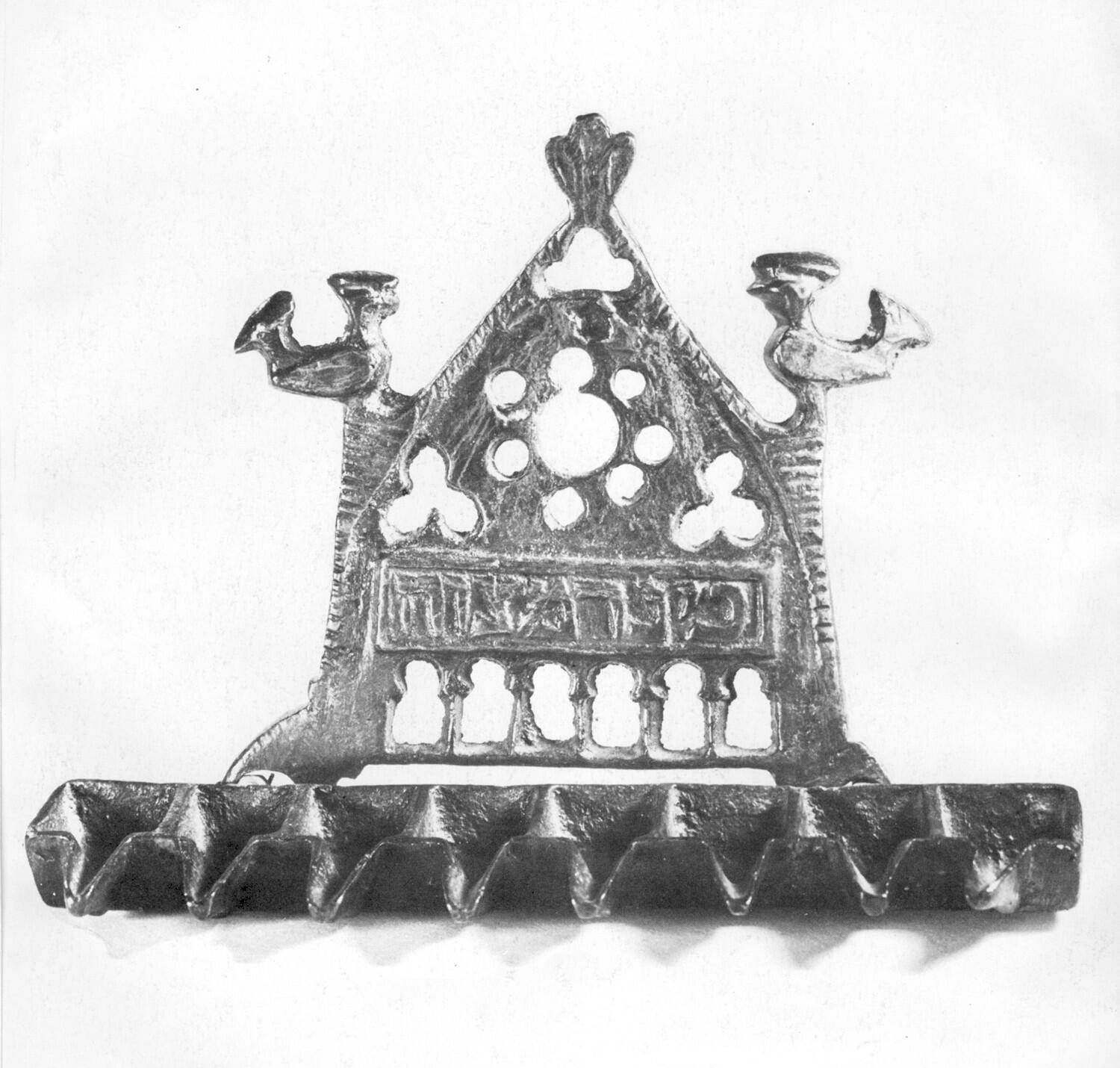
A chanukiah from Silesia
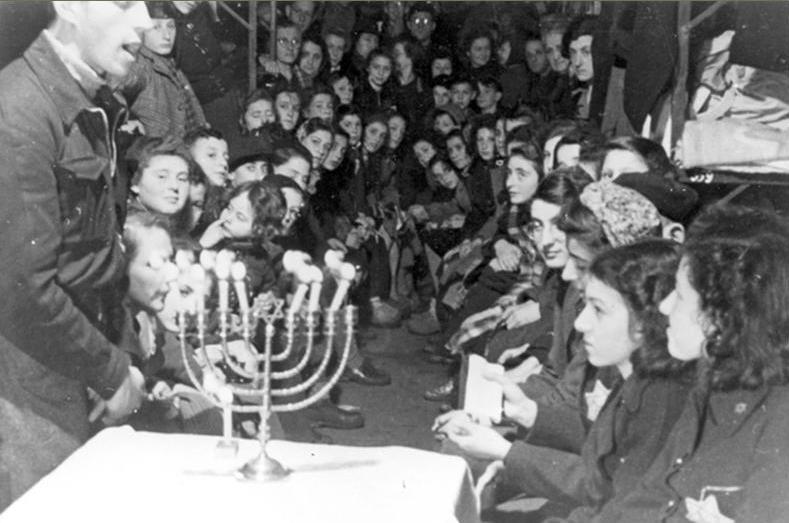
Candle lighting ceremony in Westerbork, Holland
The First Chanuka Candle
The First Chanuka Candle
Janowska camp, Lvov, Galicia, Chanuka 5703 (1942)
I suddenly remembered that tonight was the first night of Chanuka. I found two candle stubs and a match. "Jews!" I shouted like a madman, "Jews, today is the first candle of Chanuka! Jews, listen to the blessing on the Chanuka candles!" The whole barrack shook, was electrified. The people who had turned into shadows, got up and started cheering and crawling like ants to the third level (of the bunk beds), to my shelf, to my stub of a candle.
Voices are heard: "What does he want? Who dared to bless the Chanuka candles? They will immediately kill us all." "Bless him" shout others. My voice grows louder and takes over. I bless in a confident, strong voice.
There is silence in the barrack, my voice is heard in every corner "Hanerot hallalu anu madlikim al hanisim v'al haniflaot" (We light these candles for the miracles and the wonders). I am talking about the miracle of Hanukkah, I am talking about steadfast spirit and hope. It seems that my words fall like rain on parched soil. Barrack number 5 is listening.
(David Kahane, Lvov Ghetto Diary)
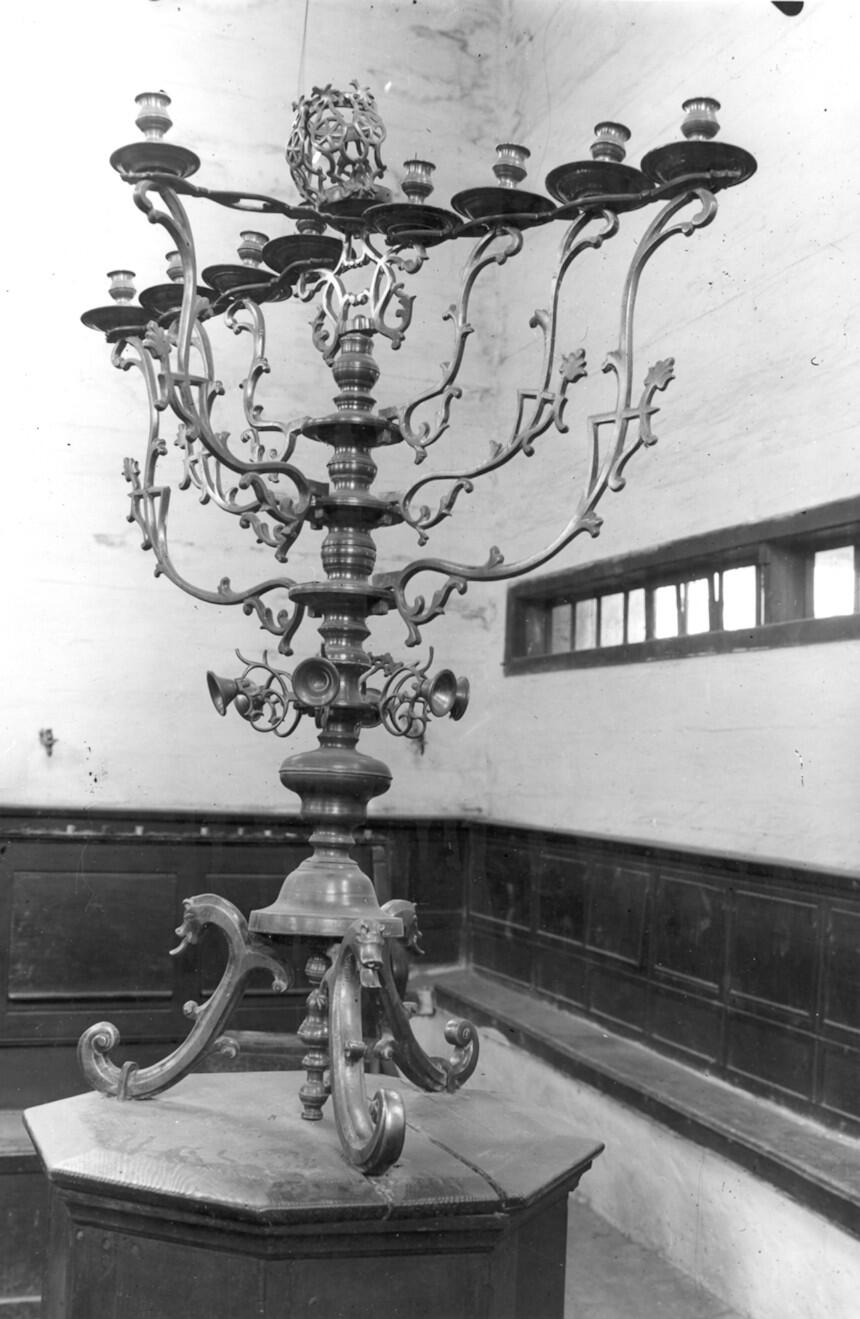
A decorated chanukiah in the synagogue in the village of Piaski
Chaim Binyamini – Chanuka in Bergen-Belsen (Budapest, Hungary)

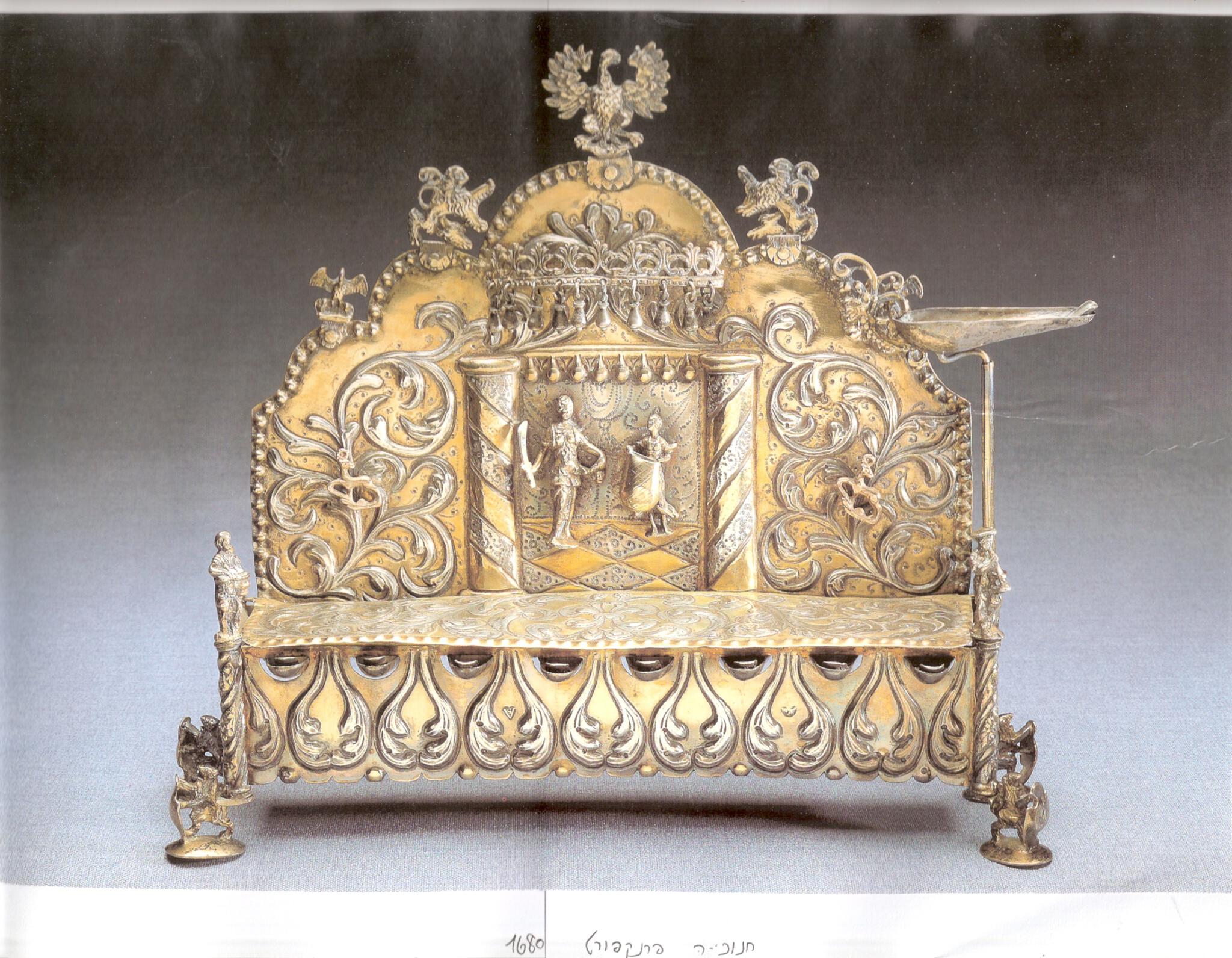
A decorated chanukiah from Frankfurt, Germany
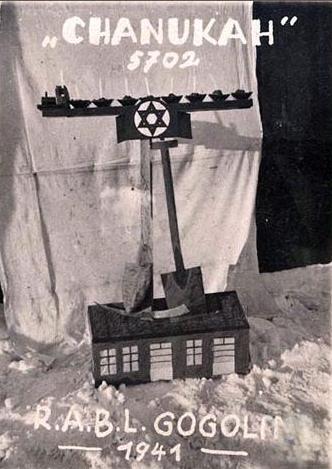
An improvised chanukiah used by Jews in the Gogolin forced labour camp, Germany, it was designed with inspiration form the slave labour performed there
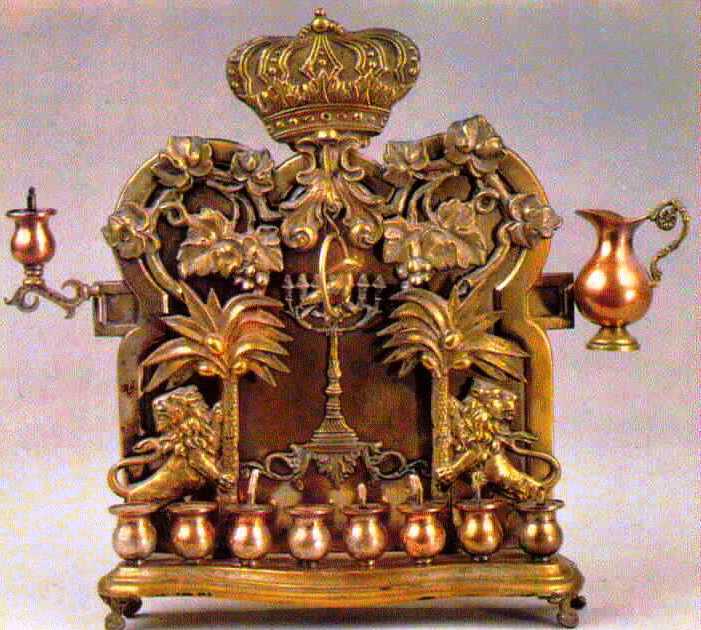
A chanukiah from Poland
Jewish Girls on Chanuka in a Labour Camp
Jewish Girls on Chanuka in a Labour Camp
A week before the holiday, I started removing the cotton threads from the garbage. We had received these threads for cleaning the machines. I began hiding them under the mattresses in the camp. One girl asked me for a practical compromise. I told her about my intentions, and when I asked her to help me get five uncooked potatoes, she was enthusiastic about the idea, and now we already have them. I cut them in half and carved a place for oil in them. I wove the cotton threads into wicks and inserted them into the potatoes. I stole the can of oil that I used to lubricate the machine at the factory and poured the oil into the potatos, and here we had a chanukia.
On the first night of Chanuka, I lit the first candle and said the blessings over it, we sang "Maoz Tzur" (Rock of Ages) together and reminisced about how we celebrated the holiday at home. When I saw the positive influence of the evening on my friends, I was convinced that I had done the right thing and I decided to continue.
For four evenings everything went well. On the 5th night, we failed. For some reason we were late in lighting the candles, which were still lit when the whistle blew to turn off the lights. In an instant, the lighting went out and in the darkness that remained we were betrayed by the points of light that emerged. The guard at the gate ran to the place where the light was, sure that we were signaling to the enemy's soldiers, who sometimes visited the area at night, broke open the door and was amazed at the spectacle that unfolded before her eyes. A tidy room, with each girl sitting on her bed and we were all singing together. I shouted: "Achtung" (Attention!) but the blood froze in me. For a few seconds I saw in my mind's eye the expected punishment, 24re-shaven heads, and worse than that - 24 pairs of accusing eyes. To the sound of a roar - "what's happening here?" - I recovered and answered: Miss supervisor, this week we have a remembrance for the Maccabees, when a few Jews defeated many enemies. I didn't think at that moment what I said to her nor did I aspire to appear heroic. But I had to answer, because the question was addressed to me. It seems as if I was posessed when I spoke, because I had no intention of defending myself at all. We all regained consciousness. The supervisor left the room, without saying a word.
And here an unbelievable thing happened, - we were not punished! On the contrary, the same SS supervisor, who distributied extra food to the girls, carried the food barrel, called me over, and while she added the porridge for me, I thought of that Chanuka night, and I was convinced again, that it was indeed worthwhile.
(Leah Neuman Weiss - Moreshet Journal)
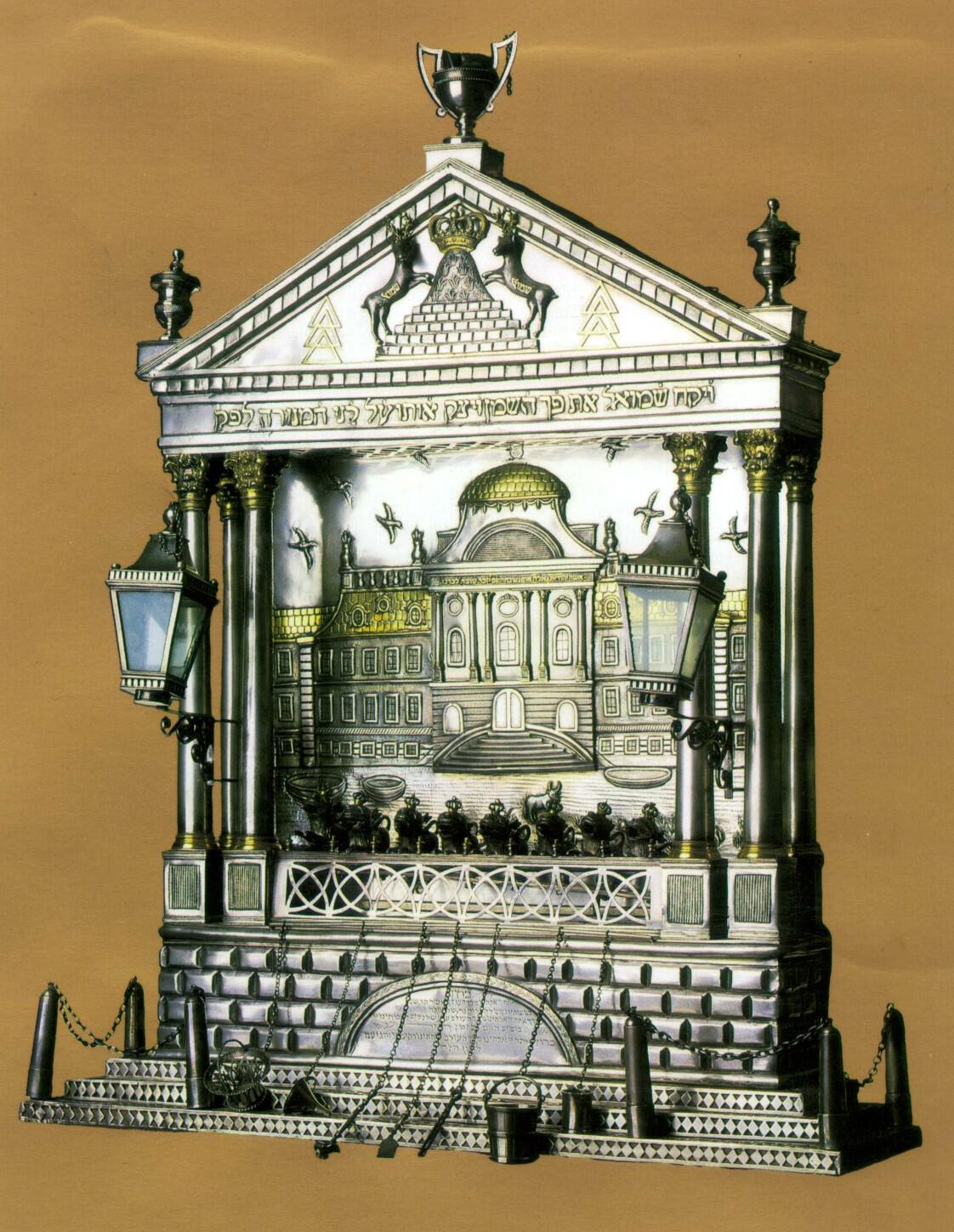
A chanukiah from 5504 (1744)
Yitzchak Cohen – Chanuka in Auschwitz (Salonika, Greece)

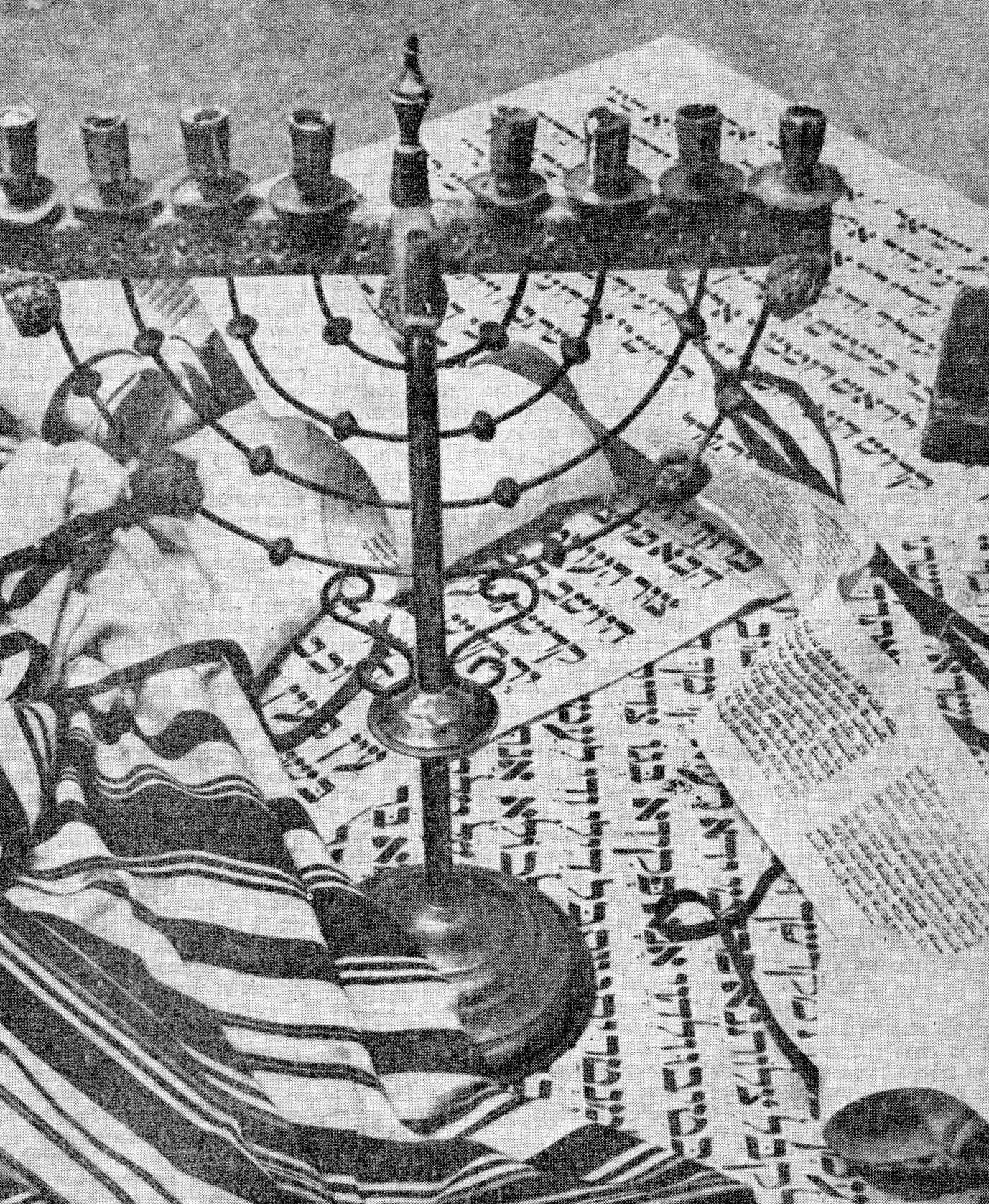
A chanukiah that was found among the ruins of a synagogue in Prague
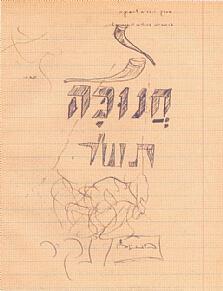
A page from the diary of Moshe Flinker, from the book “Young Moshe’s Diary”
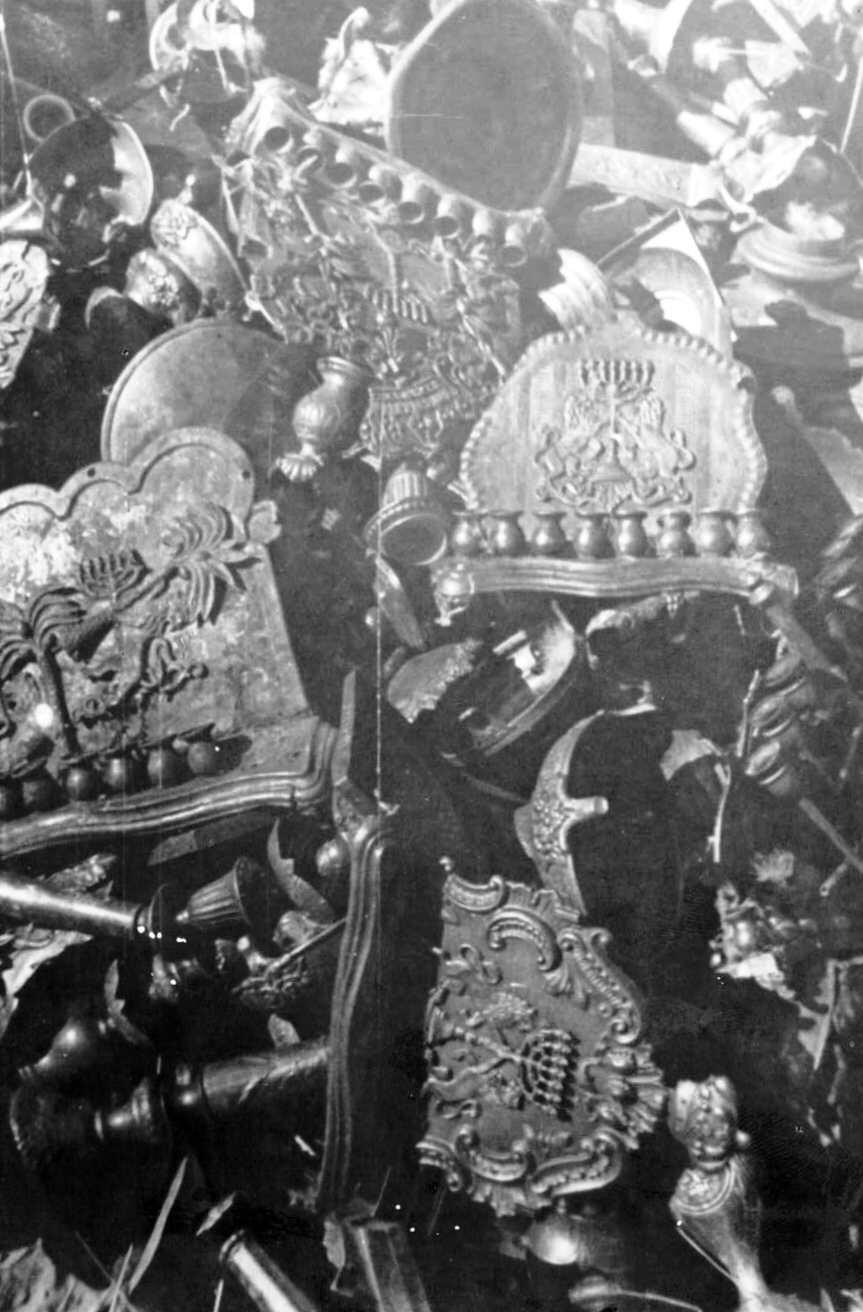
Chanukias and candlesticks that were looted by the Nazis
"Then I Shall Complete with a Song of Hymn..."
"Then I Shall Complete with a Song of Hymn..."
Warsaw Ghetto, Poland, Chanuka during the years of wrath
Lighting candles in the ghetto was a real danger, not to mention candles in the window of a house in the dark of night. Anyone who dared to violate the absolute instructions of darkness was immediately executed on the charge of signaling and helping the enemy.
It was the incomparable devotion of Meir, who decided, despite everything, to raise the flame of the mitzvah candle in his window overlooking the street of the ghetto, infested with Nazi guards.
He was known for his fondness for lighting candles for mitzvahs. In previous days, he glorified the mitzvah, and his Shabbat table was covered in precious light. But in the ghetto, where would he get candles?
This is the story of Meir. A month before Chanuka, Meir collected a few candles in all kinds of ways so that he could fulfill the mitzvah lighting Chanuka candles.
When the first night of Chanuka arrived, he was enveloped in the enthusiasm of the mitzvah, placed his chanukia by the window, excitedly recited the blessings, lit the candle, and out of joy began to sing "Maoz Tzur" (Rock of Ages).
Out of holy emotion, he completely forget the ghetto and the evil ones on its streets.
Suddenly, in the darkness of the ghetto, the police guards sensed a faint light emanating from a window of one of the houses inside the ghetto "the Jews are signaling enemy planes" - the evil ones screamed and called the Gestapo.
The Gestapo animals surrounded the house and went up to the bright room. When they entered the house, they found Meir sitting by the menorah humming the a song sung when lighting the candles, without feeling at all what was happening.
The evil ones went insane with rage, smashed the menorah, and broke the household utensils into pieces, grabbed Meir and threw him into the large lot in the ghetto, where he was tortured to death, while Meir continued to chant "Maoz Tzur… We will avenge the blood of your servants… and there is no end to the evil days."
From time to time his voice grew louder until we fell silent.
"The Chassidic World," Kislev 5756 (1995)
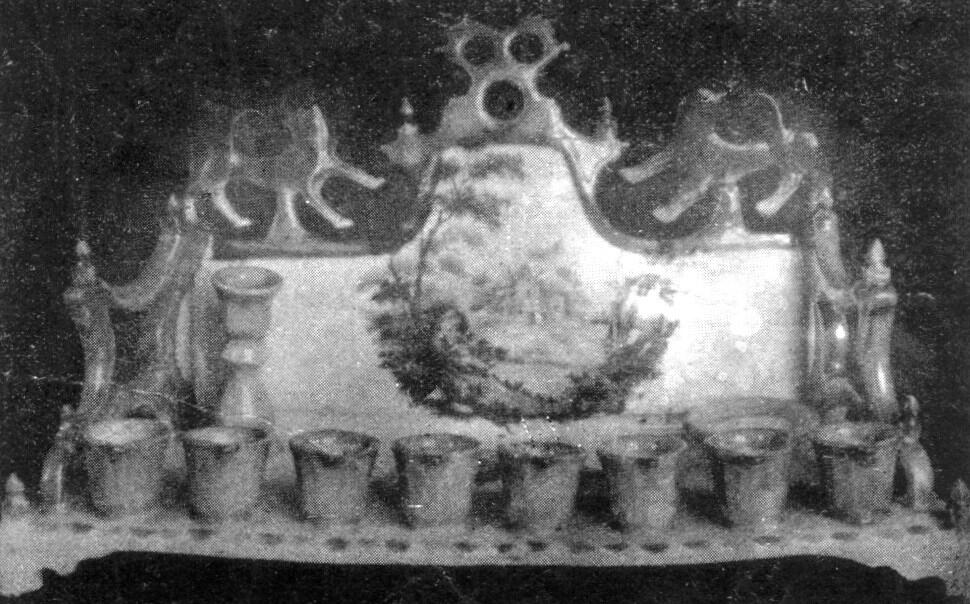
Chanukia of the Baal Shem Tov, the founder of Chassidism
Fela Eizowitzki – Chanuka in the Children’s Foundation (Poland – Belgium)

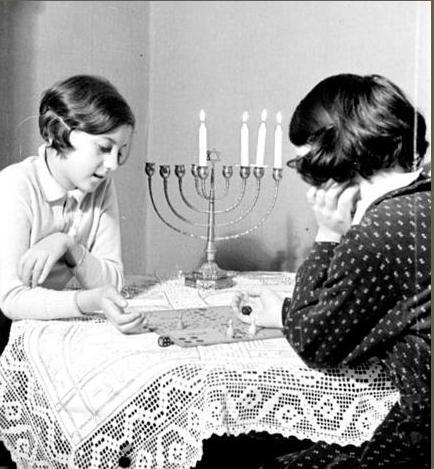
Jews girls from Berlin, Germany, played next to the Chanuka candles
“Shehechiyanu”
“Shehechiyanu”
Buna camp, Auschwitz, Poland, 5704 (1943)
After we returned from work on Sunday, our "Stubespirer" who was responsible for the food, started building a chanukia, and upon finishing his work, he approached the lighting of the candles without any fear. From the side of my bunk, I saw how he lit the candles in a loud and strong voice, and even brought a child with him, who would sing the tune of the cantor Kosowitzki's "Shehechiyanu" (that we lived). I couldn't believe my eyes, there was a lot of courage in his act, a kind of "strong whistle" at the fierce Germans, the results of which in our situation were known to all in advance, and the "blockelteste" was also very afraid, and demanded that we remember where we are, but to his credit, he did not try to deny us this special candle lighting opportunity.
Testimony of Rabbi Shalom David Horowitz, Antwerp - Bnei Brak
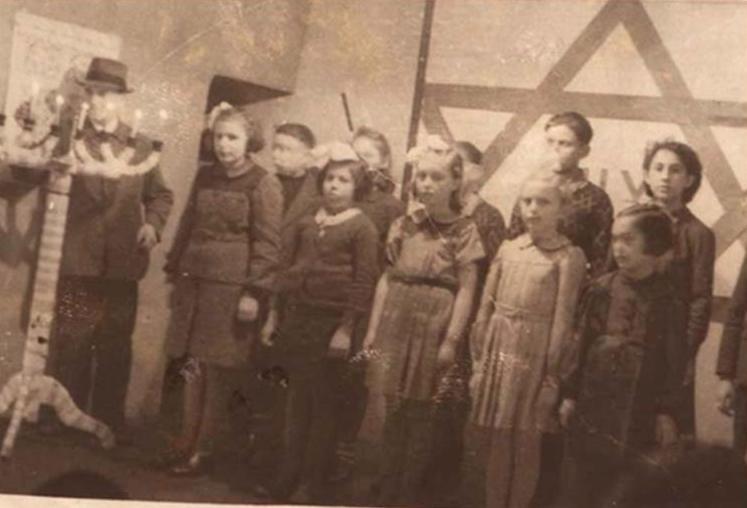
Surviving Jewish children participate in a Chanuka candle lighting ceremony in the Gluszyca DP Camp in Poland
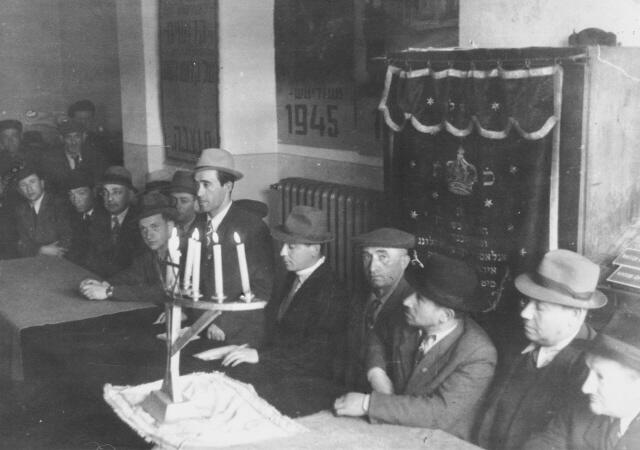
A memorial for Holocaust victims in the synoguge in the Hasenhecke DP camp in Germany
The Light of Chanuka in the Forests of the Partisans
The Light of Chanuka in the Forests of the Partisans
The forests of Lithuania, 5704 (1943)
Even in the forest where we were with the partisans we knew the times of the holidays, which we calculated while we were still in the camp. We wrote them down on papers.
On Chanuka I was the only one who lit Chanuka candles. I took a can, fat from butchered animals, and I threaded a wick in them from a piece of cloth I tore from my clothes and that's how I lit the candles.
I hung my chanukia on the tree for "pirsumei nisa" (publicizing the miracle) so I was able to spread the light of Chanuka in the darkness of the situation that I was in.
Rabbi Pinchas Tenenhaus, "Adra Eliyahu," the testimony of his father, Rabbi Eliyahu Tenenhaus, pages 132-3
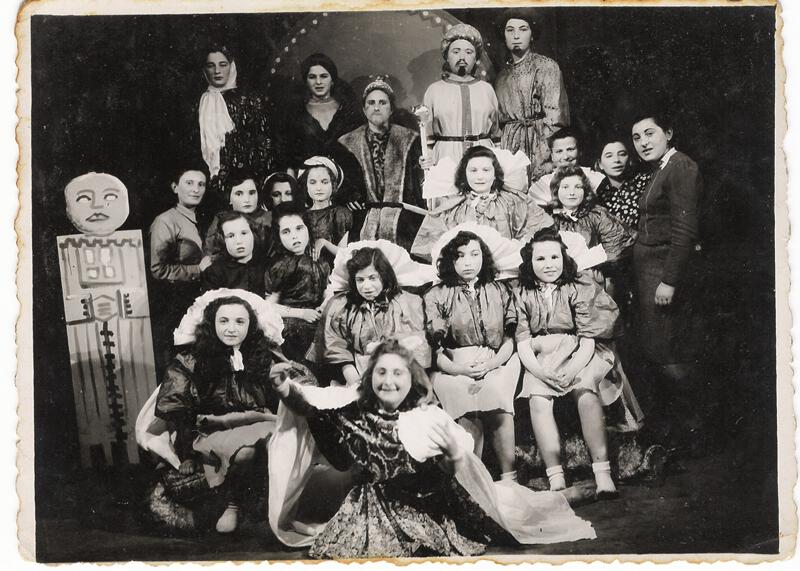
Children of the children’s home in Kibbutz Chafetz Chaim of the Ulm DP camp in a skit of “Chana and her Seven Sons,” arranged in the camp in honour of Chanuka
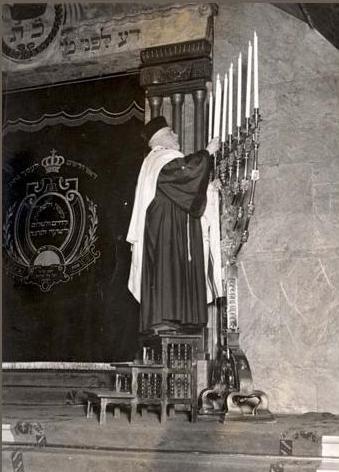
The cantor lighting the chanukiah in a synagogue in Frankfurt, Germany
Rachel Panet – Chanuka in a Forced Labour Camp in Hungary (Mako, Hungary)

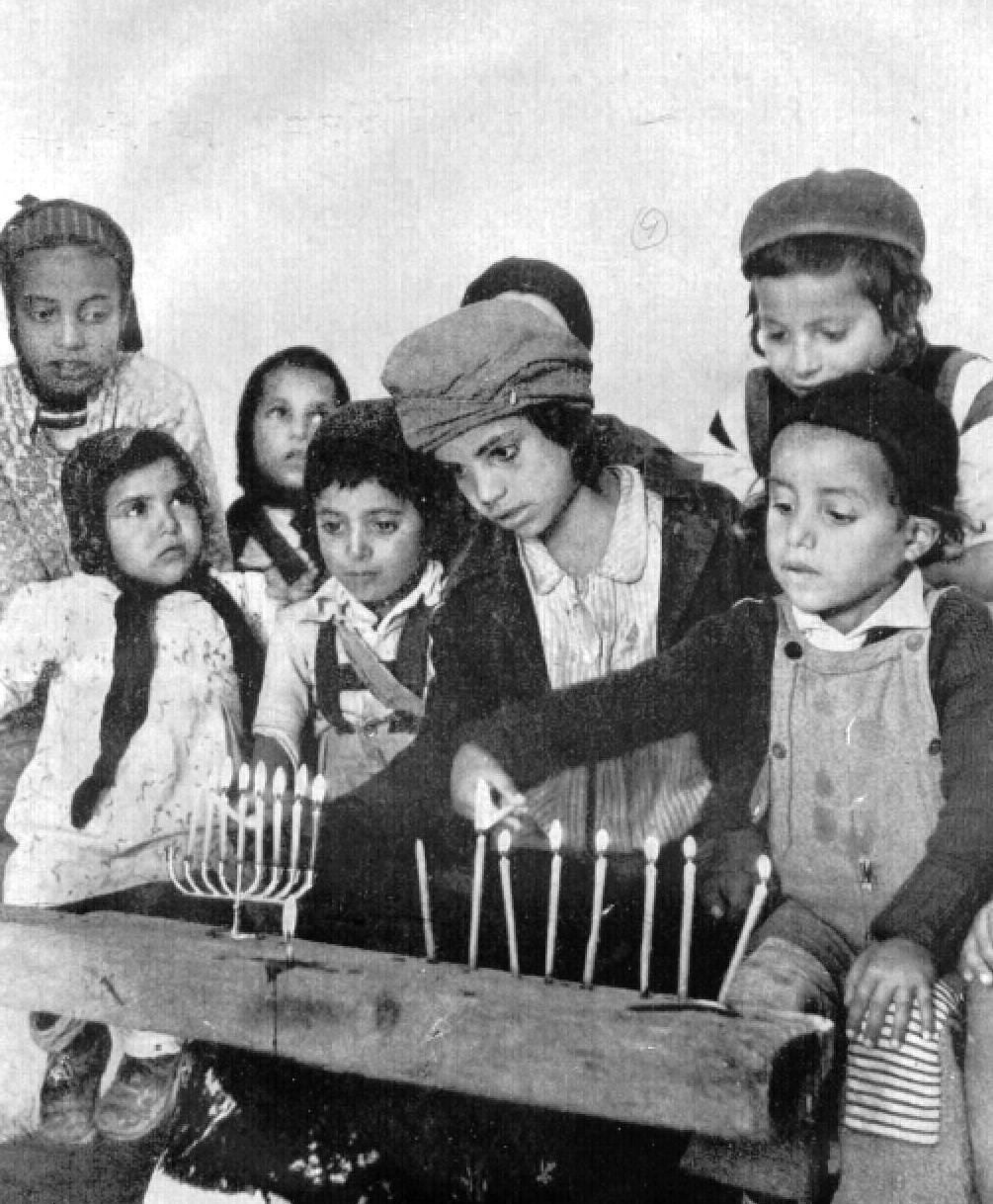
Children from Yemen lighting the Chanuka candles
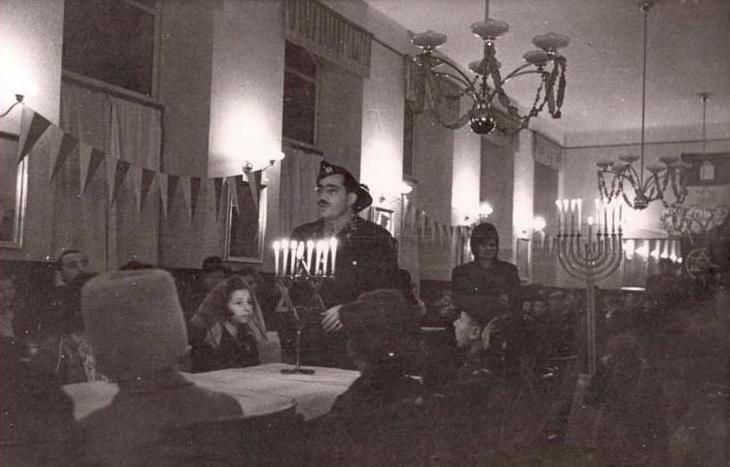
A Jewish American soldier lights a chanukiah in a DP camp in Austria
Yehoshua Eibeshitz – Chanuka in the Schwaningen Camp (Wielun, Poland)

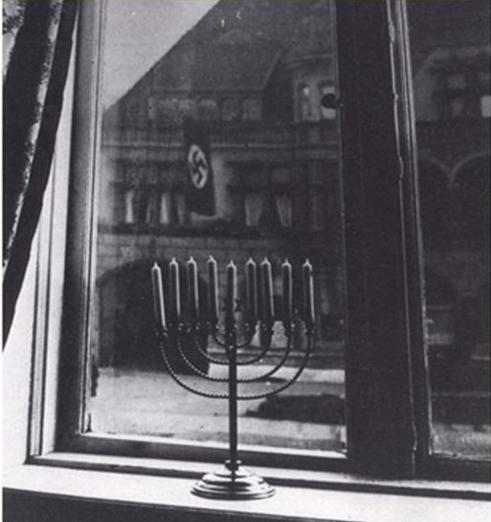
A chanukia lit on the windowsill of Rabbi Akiva Posner in Kiel, Germany. Through the window, a building can be seen, decorated with Nazi swastika flags
A Portion of Bread for Chanuka Candles
A Portion of Bread for Chanuka Candles
Koenigs-Wusterhausen camp Chanuka 5705 (1944)
It was Chanuka 5705 (1944). We were a small group of remaining Jews from Lodz. We worked 14 hours a day, separated from the outside world. We had no connection to the calendar. We didn't know anything about when Shabbat or the holidays took place.
Lying on the cold bunks, unable to sleep due to hunger and the intense cold, I came to the general conclusion that Chanuka time was approaching. Memories from long ago about my home and my father, whom the Nazis murdered in the gas chambers of Treblinka, surfaced in my thoughts. A huge and strong desire arose in me: I must live! I must live, so that I can fulfill, at least once more in my life, the mitzvah of lighting the holy candles.
I decided to sell my portion of bread to buy candles. But my portion of bread was not enough. I managed to influence two of my friends to also participate in the mitzvah. We managed to persuade an Italian prisoner who enjoyed a bit of freedom, to bring us candles, in exchange for our portions of bread.
The first night of Chanuka came. The problem was: how can we light the single candle we obtained, without the guard seeing us? We stationed one of our men by the door and we - a small group, stuck together, shoulder to shoulder, knee to knee, in the corner of the barrack. On one of the bunks that usually served as our "bed", we placed the first candle of Chanuka.
As we stood like this around the small flame, we remembered times in the past, when miracles happened, and we prayed for a miracle that would free us from our horrible situation.
Rabbi Elimelech Schwartz - The Pardes Journal
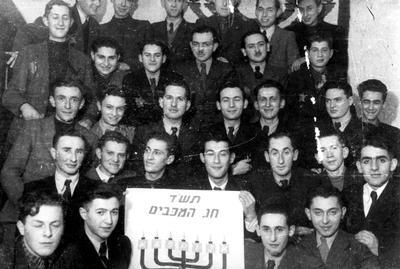
Jews in the Lodz Ghetto at a Chanuka gathering in 5704 (1943)
Rachel Fogel – Chanuka with My Mother in Auschwitz (Romania)

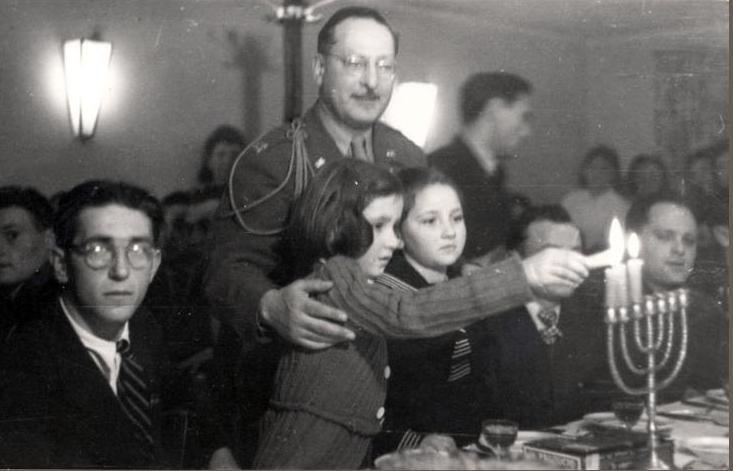
A girl lighting Chanuka candles in the Fuerstenfeldbruck DP camp in Germany, with the assistance of a Vaad HaHatzala (Rescue Organization) activist in the camp
The First Chanuka Light in Bergen-Belsen
The First Chanuka Light in Bergen-Belsen
In Bergen-Belsen, on the eve of Chanuka, a selection took place. Early in the morning, three German commandmants, meticulously dressed in their festive black uniforms and in visibly high spirits, entered the men's barracks. They ordered the men to stand at the foot of their three-tiered bunk beds.
The selection began. No passports were required, no papers were checked, there was no roll call and no head count. One of the three commandants just lifted the index finger in his snow-white glove and pointed in the direction of a pale face, while his mouth pronounced the death sentence with one single word: "Come!"
Like a barrage of machine gun fire came the German commands: "Komme, komme, komme, komme, komme." The men selected were marched outside. SS men with rubber truncheons and iron prods awaited them. They kicked, beat, and tortured the innocent victims. When the tortured body no longer responded, the revoler was used...
The random selection went on inside the barracks and the brutal massacre continued outside of the barracks until sundown. When the Nazi black angels of death departed, they left behind heaps of hundreds of tortured and twisted bodies.
Then Chanuka came to Bergen-Belsen. It was time to kindle the Chanuka light. A jug of oil was not to be found, no candle was in sight, and a chanukia belonged to the distant past. Instead, a wooden clog, the shoe of one of the inmates, became a chanukia; strings pulled from a concentration camp uniform, a wick; and the black camp shoe polish, our oil.
Not far from the heaps of bodies, the living skeletons assembled to participate in the kindling of Chanuka lights.
The Rabbi of Bluzhov lit the first light and chanted the first two blessings in his pleasant voice, and the festive melody was filled with sorrow and pain. When he was about to recite the third blessing, he stopped, turned his head, and looked around as if he were searching for something.
But immediately, he turned his face back to the quivering small lights and in a strong, reassuring, comforting voice, chanted the third blessing: "Blessed art Thou, O Lord our G-d, King of the Universe, who has kept us alive, and hast preserved us, and enabled us to reach this season."
Among the people present at the kindling of the lights was a Mr. Zamietchkowski, one of the leaders of the Warsaw Bund. He was a clever, sincere person with a passion for discussing matters of religion, faith, and truth. Even here in our camp at Bergen-Belsen, his passion for discussion did not abate. He never missed an opportunity to engage in sucha conversation.
As soon as the Rabbi of Bluzhov had finished the ceremony of kindling the lights, Zamietchkowski elbowed his way to the rabbi and said, "Spira, you are a clever and honest person. I can understand your need to light Chanuka candles in these wretched times. I can even understand the historical note of the second blessing, 'Who wroughtest miracles for our fathers in days of old, at this season.' But the fact that you recited the third blessing is beyond me. How could you thank G-d and say 'Blessed art Thou, O Lord our G-d, King of the Universe, who has kept us alive, and hast preserved us, and enabled us to reach this season?' How could you say it when hundreds of dead Jewish bodies are literally lying within the shadows of the Chanuka lights, when thousands of living Jewish skeletons are walking around in camp, and millions more are being massacred? For this you are thankful to G-d? For this you praise G-d? This is called 'keeping us alive?'"
"Zamietchkowski, you are a hundred percent right," answered the rabbi. When I reached the third blessing, I also hesitated and asked myself, what should I do with this blessing? I turned my head in order to ask the Rabbi of Zaner and other distinguished rabbis who were standing near me, if indeed I might recite the blessing. But just as I was turning my head, I noticed that behind me a throng was standing, a large crowd of living Jews, their faces expressing faith, devotion, and concentration as they were listening to the tie of kindling the Chanuka lights. I said to myself, if G-d, blessed be He, has such a nation at times like these, when during the lighting of the Chanuka lights they see in front of them the heaps of bodies of thei beloved fathers, brothers, and sons, and death is looking from every corner, if despite all that, they stand in throngs and with devotion listening to the Chanuka blessing 'Who wroughtest miracles for our fathers in days of old, at this season;' if, indeed, I was blseed to see such a people with so much faith and fervor, then I am under a special obligation to recite the third blessing."
Some years after liberation, the Rabbi of Bluzhov, now residing in Brooklyn, New York, received regards from Mr. Zamietchkowski. Zamietchkowski asked the son of the Skabiner Rabbi to tell Israel Spira, the Rabbi of Bluzhov, that the answer he gave that dark Chanuka night in Bergen-Belsen had stayed with him ever since, and was a constant source of inspiration during hard and troubled times.
Based on a conversation with the Rabbi of Bluzhov, Rabbi Israel Spira, with Aaron Frankel and Baruch Singer, June 22, 1975. Heard at the rabbi's house. Hasidic Tales of the Holocaust, Yaffa Eliach, pages 13-15
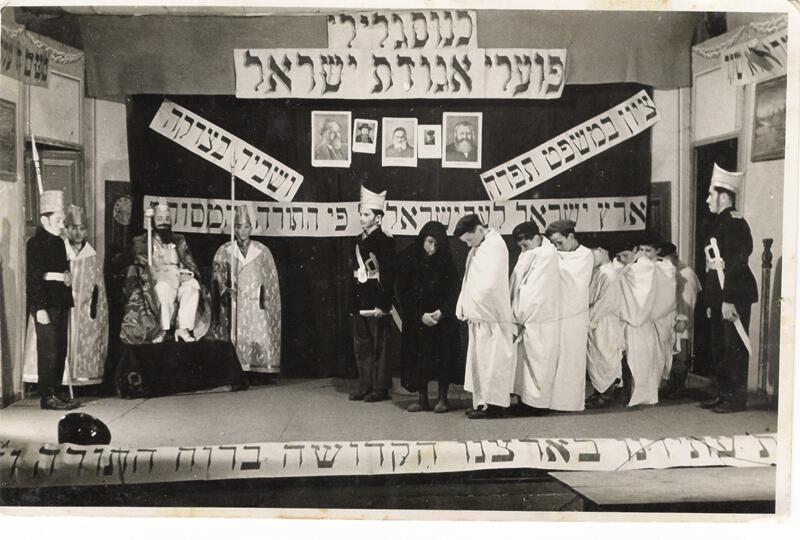
Children dressed up in a Chanuka play organized by Poalei Agudath Israel in a DP camp. The walls of the hall are decorated with photos of the Chafetz Chaim and other rabbis, and the posters are calling for the future “in our holy Land of Israel in the spirit of the Torah…the Land of Israel for the People of Israel.”
Esther Dawidowicz – A Chanuka Candle in Bergen-Belsen (Hungary)

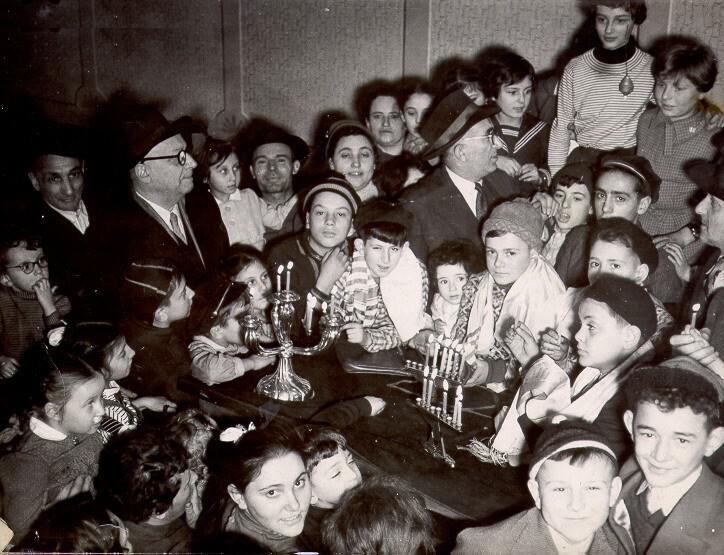
A children’s Chanuka party in one of the DP camps
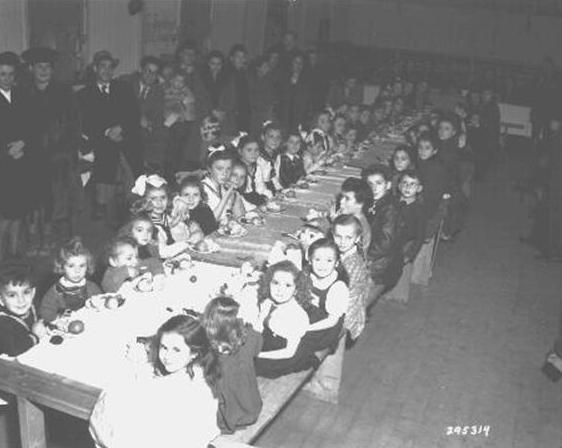
A children’s Chanuka party in the Furth DP camp. Gifts were donated by the families of the American soldiers who were living in the army in the city of Nuremberg
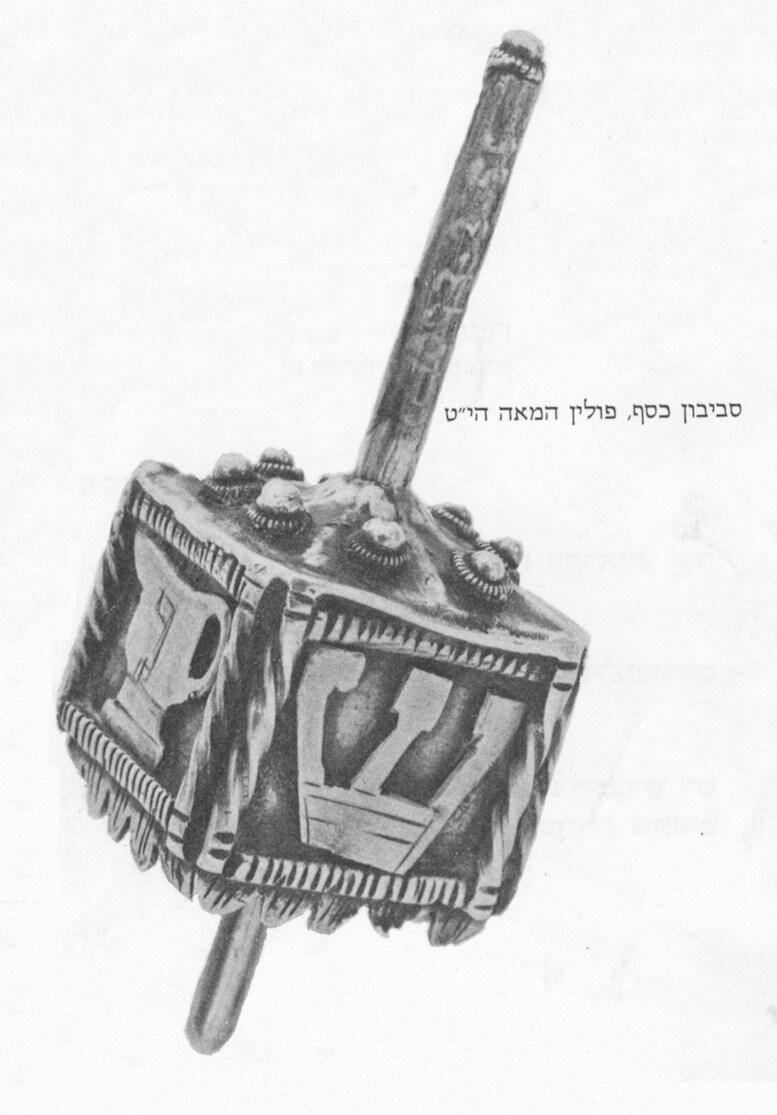
A silver dreidel from Poland from the 19th century
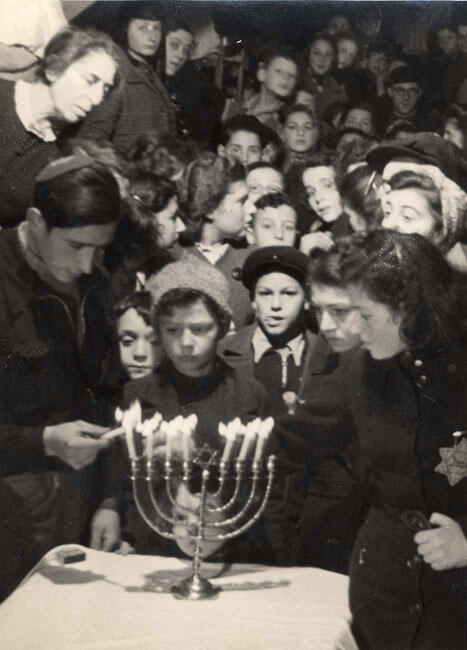
Young Jews light the chanukiah in the Westerbork camp, Holland. The young girl on the right wears the yellow badge.
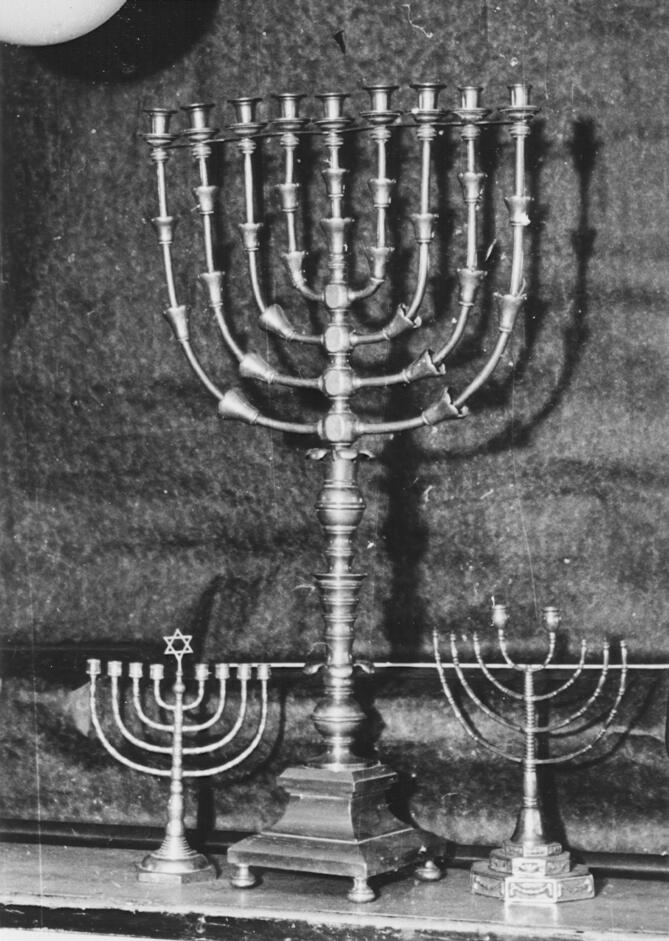
A display of chanukias that were confiscated by the Nazis during the Holocaust
Yisrael Isaac Kuzik – Chanuka with the Imrei Emet in Gur (Poland)

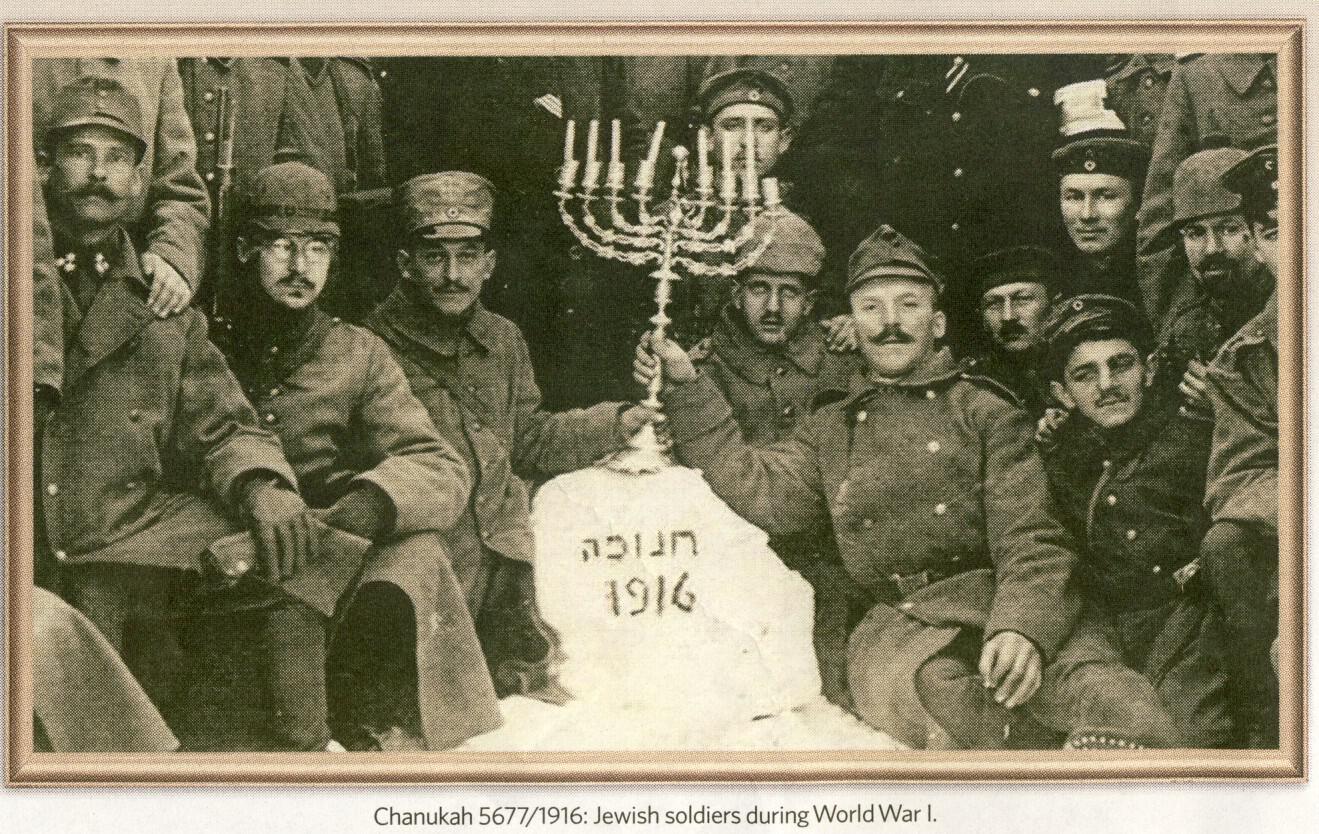
Jewish soldiers in the Russian army light the chanukiah during WWI
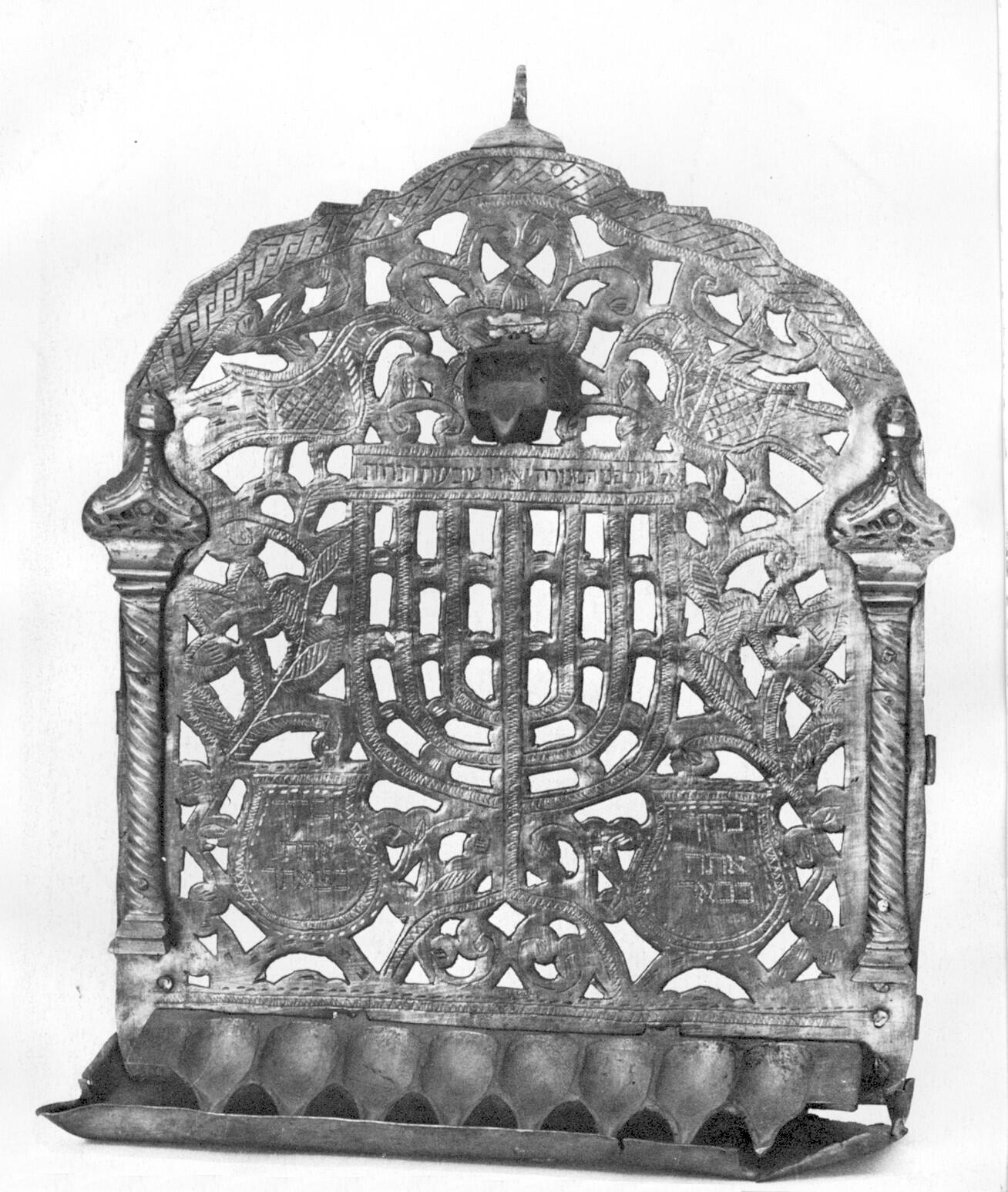
A Chanukia from Morocco
A Chanuka Candle in Schwaningen
A Chanuka Candle in Schwaningen
Chanuka of 5703 fell at the beginning of December 1942. The days were cold. Strong winds and angry rains disturbed our tormented lives. We would go out to the workplace almost naked. Anyone who was caught covering himself with a paper bag from the cement - which he carried in the workplace - was beaten to death by those who approached. We look like scarecrows. And one evening we returned to the camp, tired and exhausted. But then a whisper was heard in the barrack: "The Chanuka candle is being lit"… It was not said who was lighting it or where it was being lit. It was interesting to see how the "dry bones", "muselmen," who had not a drop of strength left in them, suddenly woke up, and with their sharp senses began to "sniff", until they located the place - out of fear of the Germans, the event and its location was kept low-key, only a few knew about it. But it was difficult to hide the secret, and so a large crowd gathered near the cobblers' workshop. All of them could not squeeze in, into the not-so-large room. Most of them stayed outside.
What and who was behind the lighting of the Chanuka candle? After the act, I learned the details: Rabbi Reuven Israel Kot - the "rabbiner" as he was called by the camp commander, and Rabbi Fishel Schulzinger, tried very hard to get a candle, even a single candle, for the purpose of lighting it for Chanuka. At least for the first candle. But all their efforts bore no fruit. They asked all the prisoners who had contact with gentiles from the outside, or with watchmen, to try to get candles. And here on the eve of Chanuka, Sontag, a hatter from Dobra, who worked in the craftsmen's workshop, came and informed Rabbi Fishel Schulzinger with great excitement that he had managed to obtain a single candle. Great was the joy among the handful of people who knew about the secret. But soon many people learned about it. And people began to gather near the cobblers' workshop. They didn't want to give up the whole experience of lighting a Chanuka candle. At the lighting of the candle, Rabbi Fishel Schulzinger was honored. He was very moved by saying the three blessings. Especially when he said the blessing "that we have lived"… "and we have reached this time"...
The organizers did well to try to keep the lighting of the Chanuka candle as modest as possible. Although the main reason for the lighting is because of "pirsumei nisa" (publicizing the miracle). But in our case, it was life-threatening, really. The crowd of prisoners that gathered near the cobblers' workshop, hummed in a whisper the traditional hymn of "Maoz Tzur" (Rock of Ages), and deliberately and with special emphasis, repeated it and said: "Avenge the blood of your slaves from the evil nation"…
(Like a Lone Tree in the Plain - Yehoshua Eibeshitz)
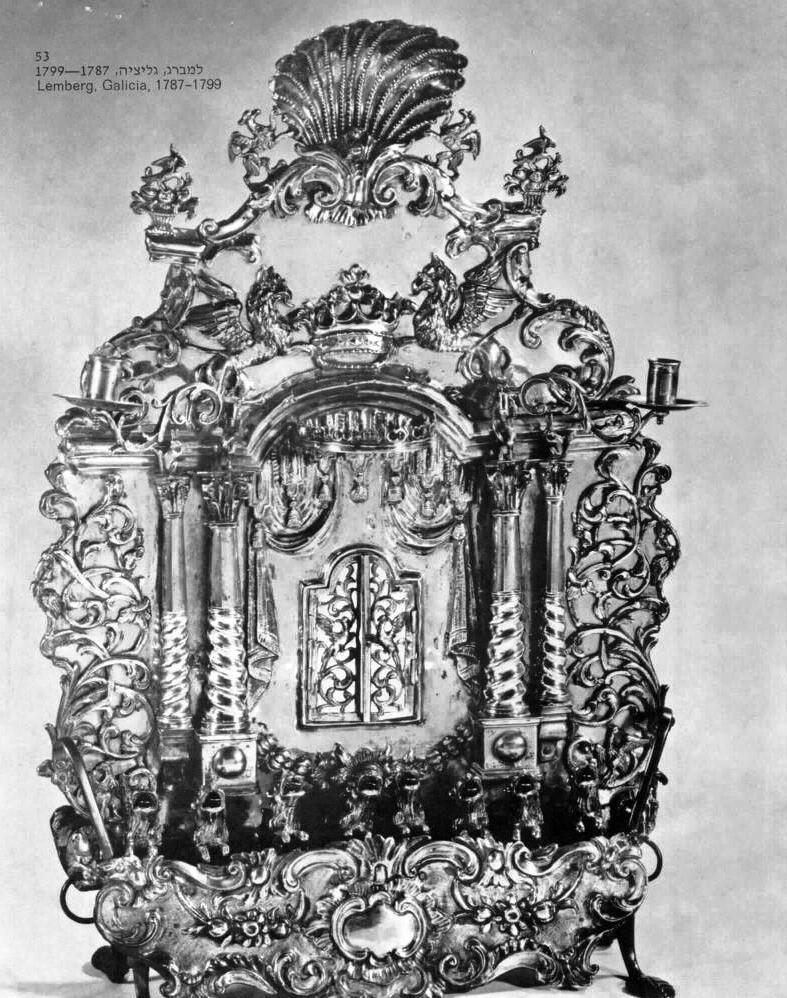
A chanukia from Lemberg
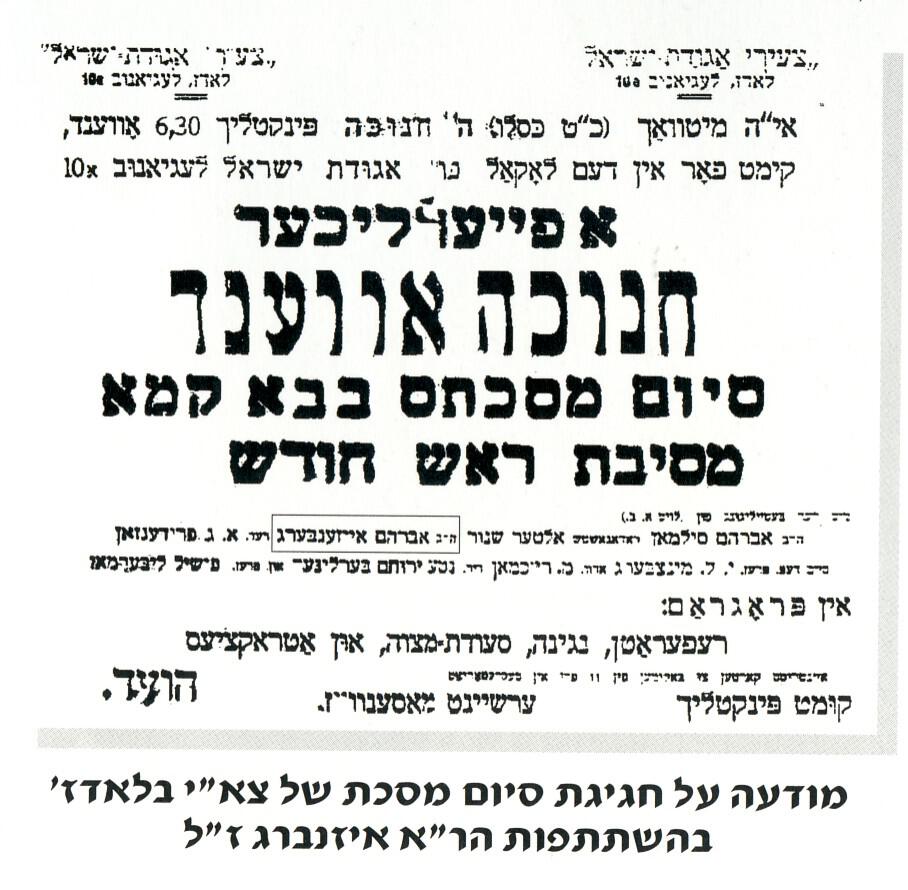
Advertisement on behalf of the youth of Agudath Israel of Lodz regarding a celebration for Rosh Chodesh, Chanuka, and a completion ceremony for learning a tractate of Mishna, with participation of rabbis, including Rabbi Avraham Shlomo Eisenberg
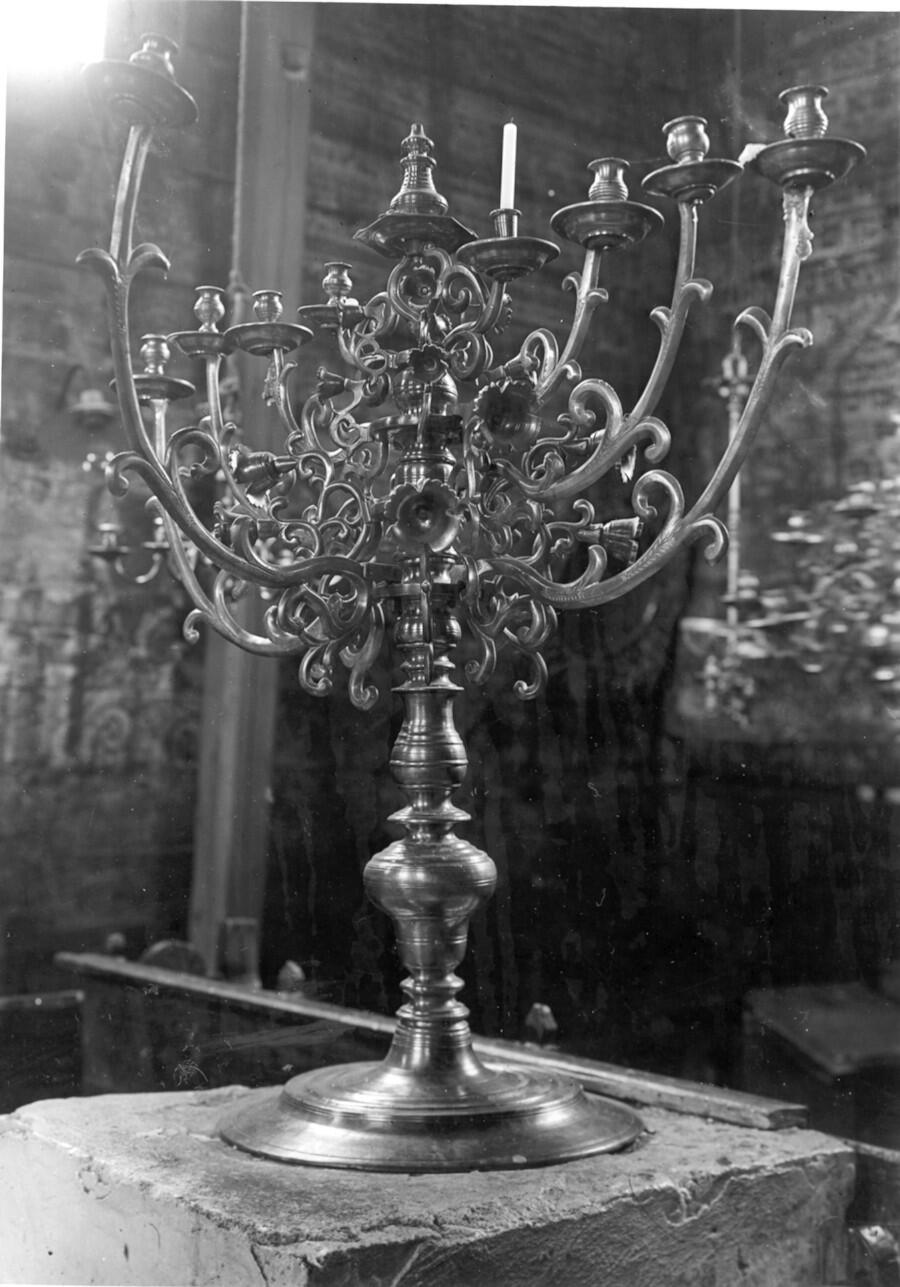
A carved chanukiah in the synagogue on Zabludow
Moshe Kugler – Chanuka in the Domonkos Children’s Home (Sopron, Hungary)

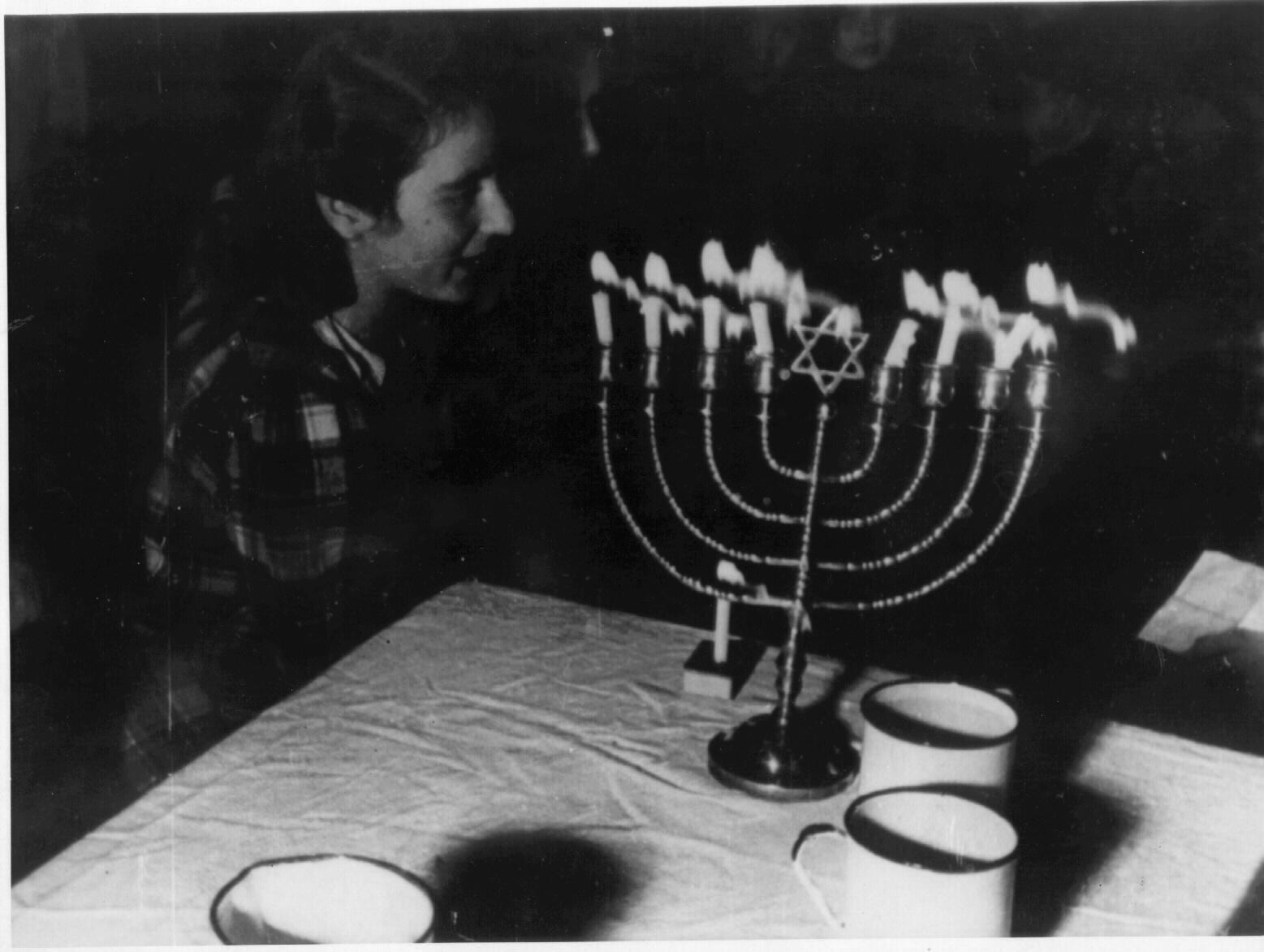
Chanuka candles in the Westerbork camp
One Candle of Hope
One Candle of Hope
In our barrack - the youth barracks in the Auschwitz camp, boys from various countries enslaved under the Nazi regime were concentrated. Most of them were from Central Europe, but there were a large number of boys from Greece, to whom the German occupiers arrived. Among them were those who were observant of Torah and mitzvahs, who had a good command of the Hebrew language and therefore, we could converse with them. Every day, we would gather in one of the corners of the barrack for public prayer. Praying in public and keeping the mitzvot meant that close friendships were formed between us, even though the places of origin were different and far from each other.
Chanuka arrived. We managed to get one candle, which was a very meaningful thing for us. On the first night of Chanuka, we gathered on the top level of one of the bunks and together we lit the candle that was very dear to us. This burning candle lit new hopes for a good future in our hearts as well, and strengthened our confidence in the "Maoz Tzur Yeshuati" (the Stronghold of my salvation). At that moment, we were awakened by the great longings for the past, during which we celebrated Chanuka, each one at his parents' house with joy. But this past was gone and was no more. Therefore, the request that emanated from the depth of our hearts for the future, which although it was still far from us, would be fulfilled in the prayer that was recited then, and it is "Prepare a house of prayer and there a thanksgiving offering will be sacrificed"..."Then I shall complete with a song of hymn."
Testimony of Rabbi Sinai Adler
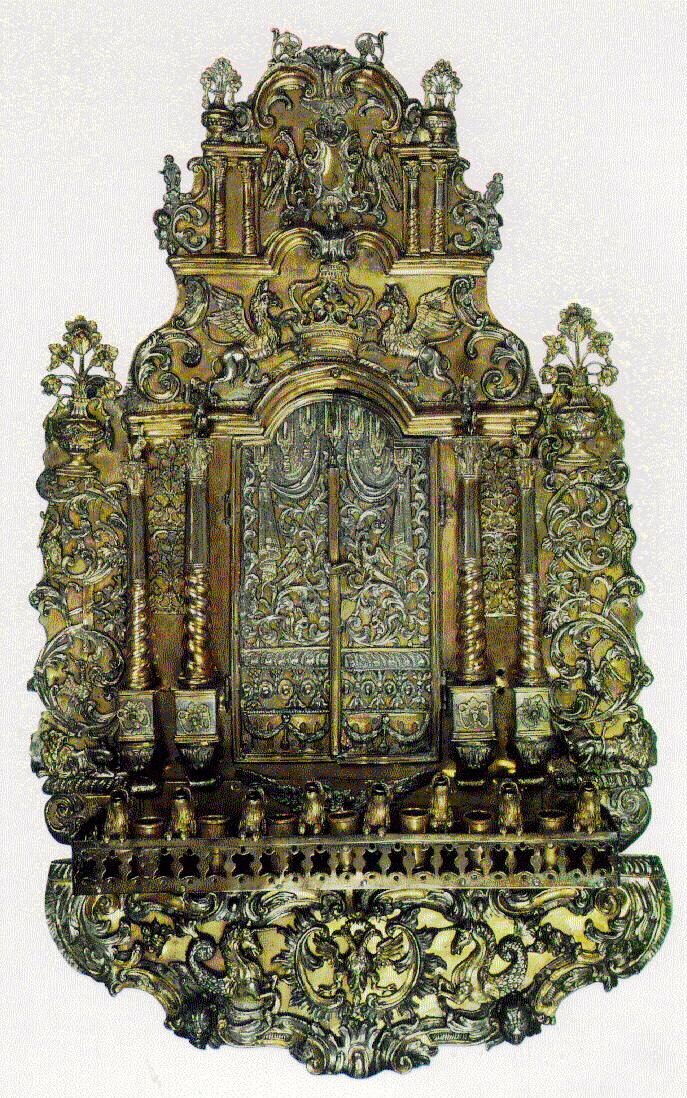
A chanukiah from Frankfurt, Germany
Bracha Sternberg – A Chanuka Candle in Frozen Siberia (Hrubieszow, Poland)

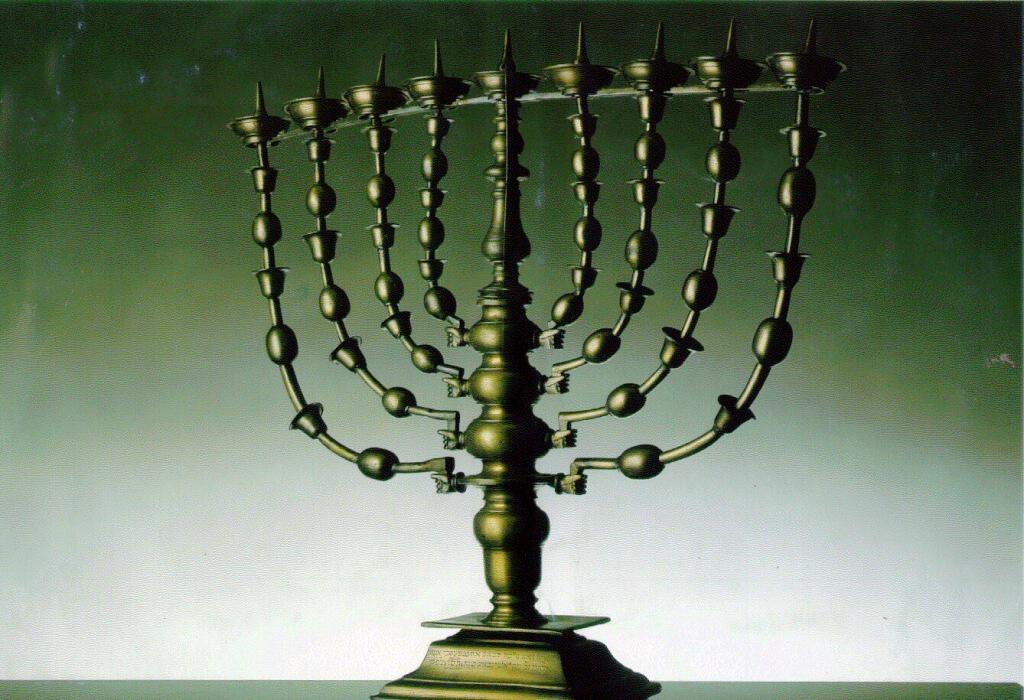
A chanukiah from 18th century Germany
For the Light of Chanuka Candles
For the Light of Chanuka Candles
Last Thursday, we lit candles for the last time this Chanuka. We three - my father, my younger brother, and I - merited to light the eight candles. Despite it being very difficult to obtain candles, we put in a great effort and we were able to buy them at an expensive price. While we sang the last stanza of "Maoz Tzur" (Rock of Ages) I wondered a lot about the acceptance of our troubles today.
"Expose your holy arm
And bring the the time of the redemption.
Avenge the blood of your servants
From the evil nation
For the salvation has been a long time in coming
And there is no end to the days of evil."
With the singing of "Maoz Tzur" the last time for this Chanuka, I put particular emphasis on the song and particularly on the last stanza.
But when I later sat down alone, I thought to myself what would be the use of emphasizing, what privilege is standing at my right hand that I can pray for the deliverance that we so need.
Young Moshe's Diary, Moshe Flinker
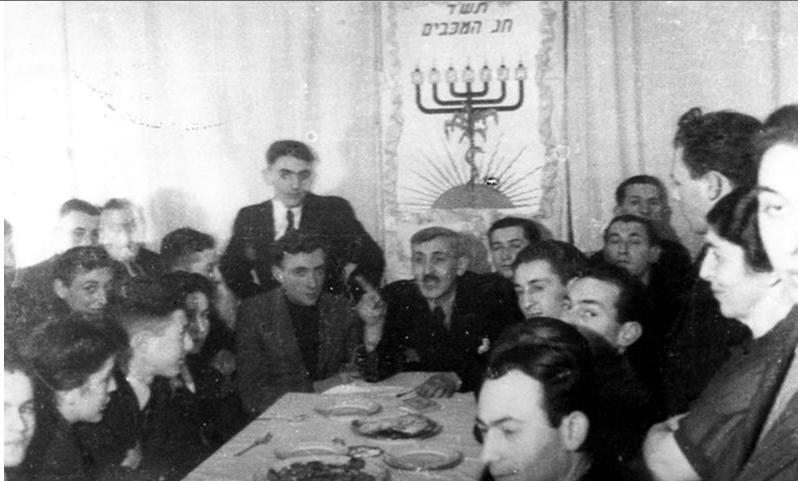
A Chanuka party in the Lodz Ghetto
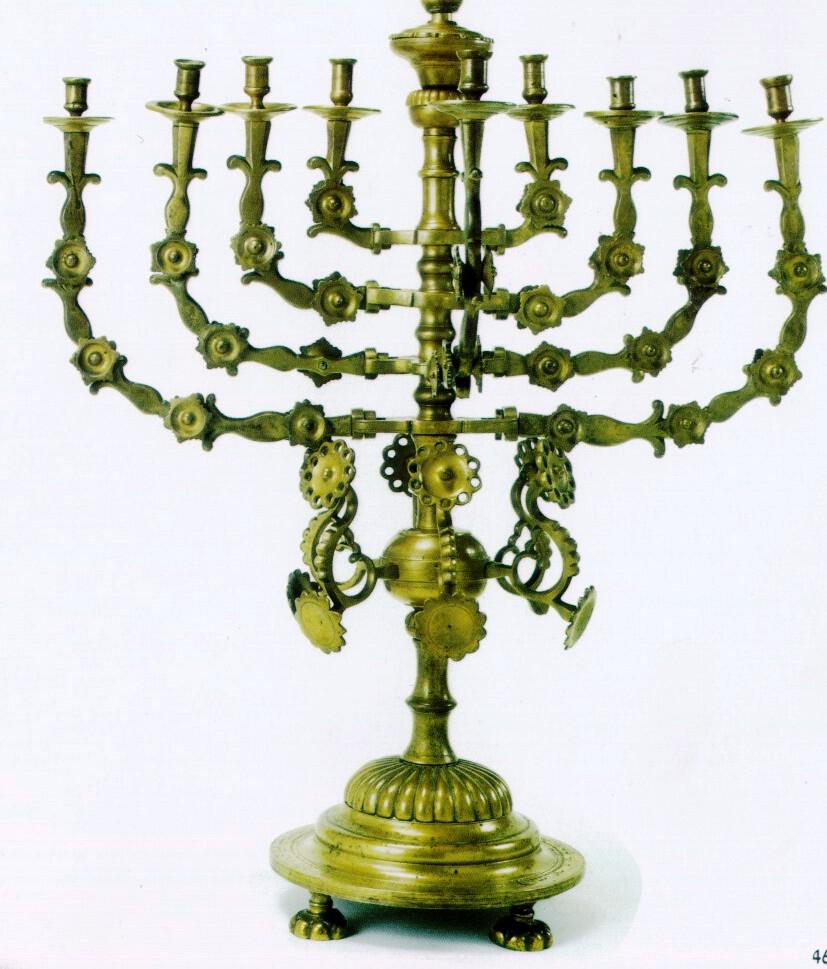
A Chanukia from a synagogue in Galicia
Yaakov Kopel Reinitz – A Chanuka Candle without a Blessing (Budapest, Hungary)

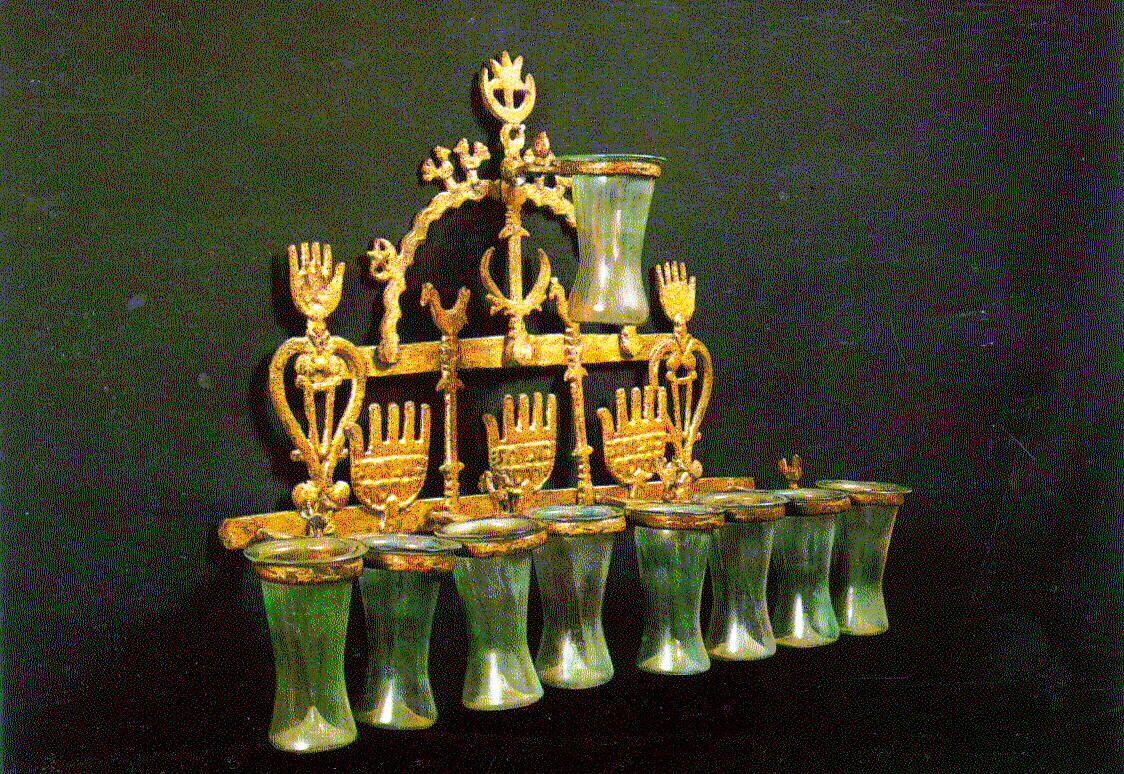
A brass chanukiah from Baghdad
Chanuka in the Warsaw Ghetto
Chanuka in the Warsaw Ghetto
Warsaw Ghetto, Chanuka 5703 (1942)
The short negotiation with the Polish smuggler Bartek ended to the satisfaction of the Jewish forced laborer. The Gentile provided the requested goods at the price of a valuable box of cigarettes.
Now it was possible to light the first candle of Chanuka at the gates of the destroyed Warsaw Ghetto. At the end of the exchange deal, Leibel Pinkuszewitz managed to convince the Polish gentile to make available to him the window of his apartment, next to the ghetto gate. "For it's Chanuka," Label justified his request "to light the candles there for a few moments!"
A dark winter night covered all of Warsaw. The Nazis occasionally turned on their flashlights, and the gentile Bartek agreed to the Jew's small condition… Leibel's voice trembled as he said the blessings "to light a Hanukkah candle"… "Who did miracles for our ancestors in those days…" and "that He gave us life, that He sustained us, and that we reached this time".
Quite a few forced laborers were present there and swept away in the joy. The first candle of Chanuka was lit in the window. Moments of anxious anticipation. Moments or hours? Moments as long as hours? Moments that are as precious as eternity?
The last winter in the sinking Warsaw Ghetto, and there was no price to compare to this Chanuka candle!
Testimony of Leibel Pinkuszewitz
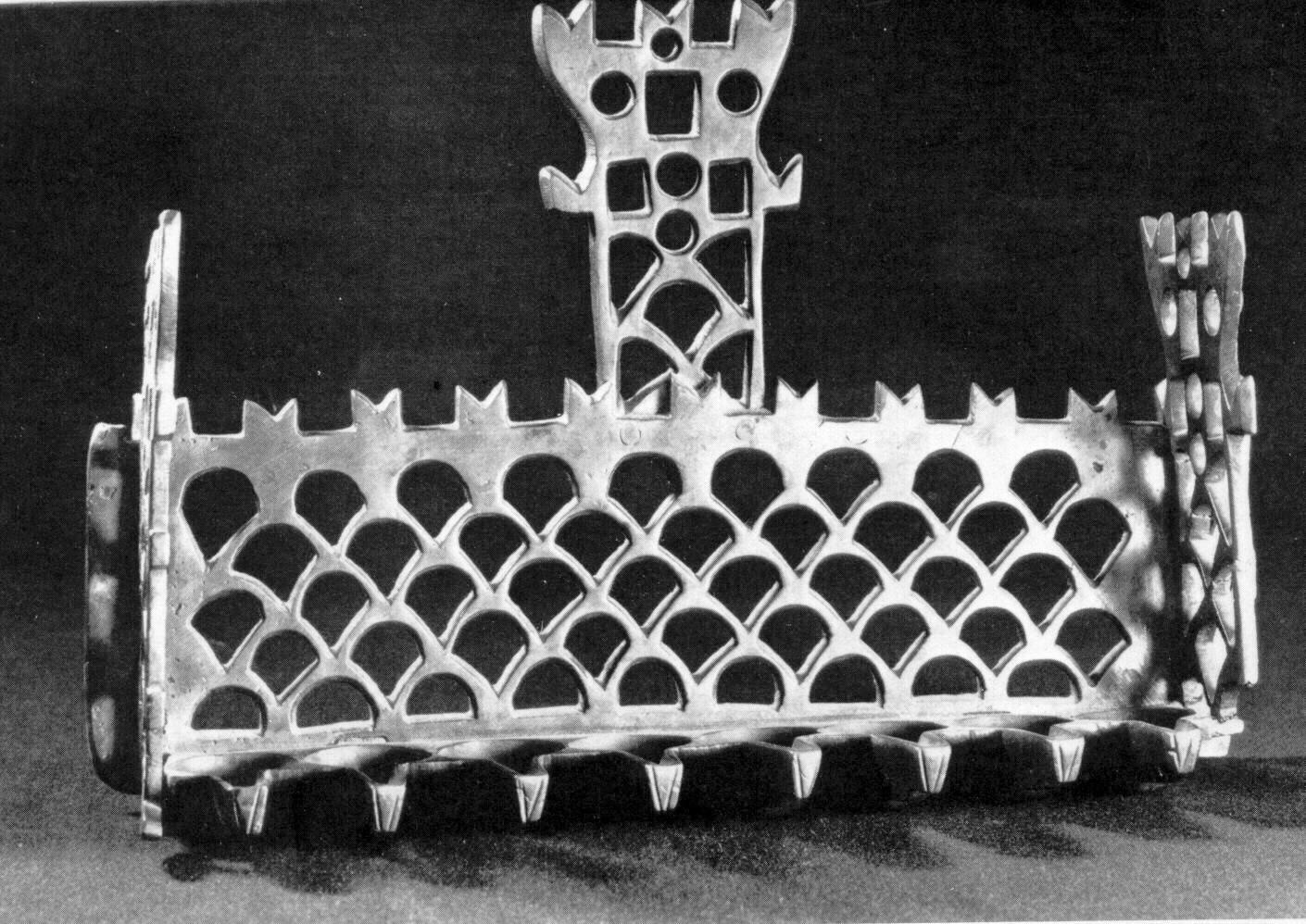
A cast bronze chanukiah from Italy
Margalit Birenbaum and Gisele Fonfeder – A Chanuka Candle in Ravensbruck (Holland)

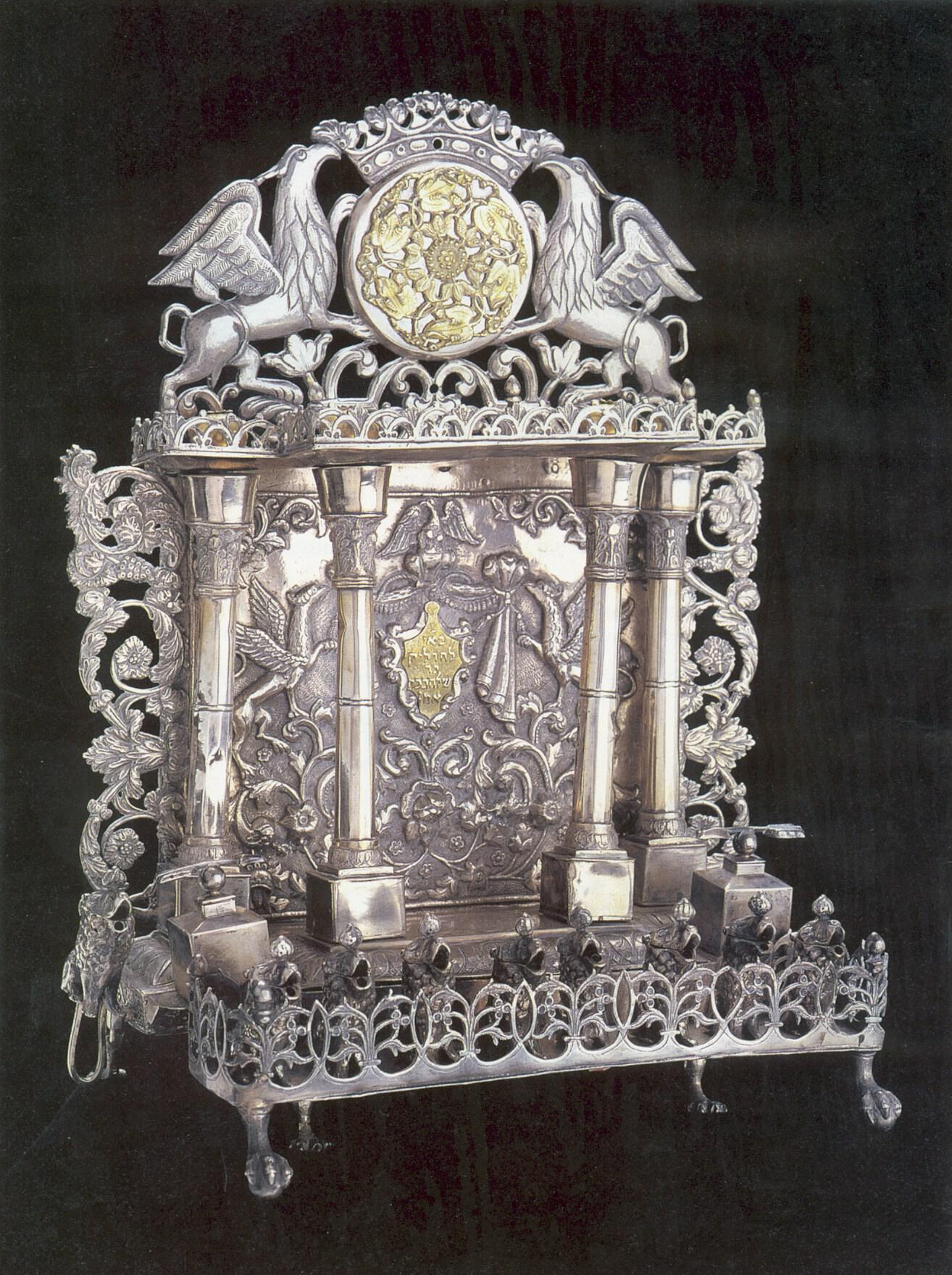
A chanukiah from Ukraine
To Celebrate even if It Upsets Them…
To Celebrate even if It Upsets Them…
Lodz, Poland, Chanuka 5700 (1939)
Let's celebrate like every year, let's have a feast, that will spark the spirit of life within us" - decided the members of the group of men, who said to celebrate the Chanuka miracle despite the anger of the Germans.
Despite the growing distress and the many restrictions imposed in them, the menheld a feast in honor of Chanuka.
It was, admittedly, a meager feast, but the joy slightly overshadowed their sad situation.
Rabbi Yehoshua Moshe Aharonson, "Bitter Leaves," pages 47-48
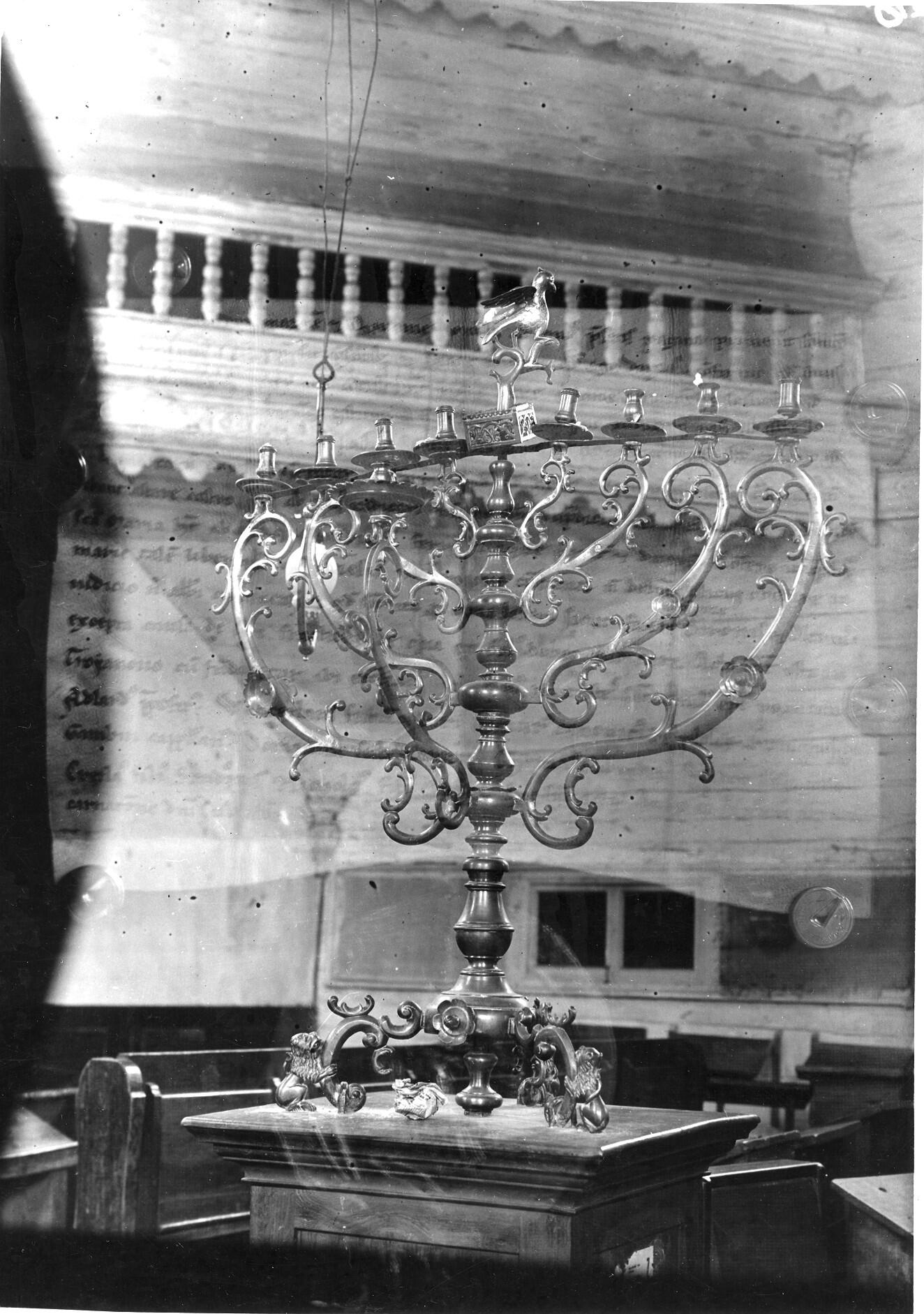
A chanukiah in a synagogue in Grodno
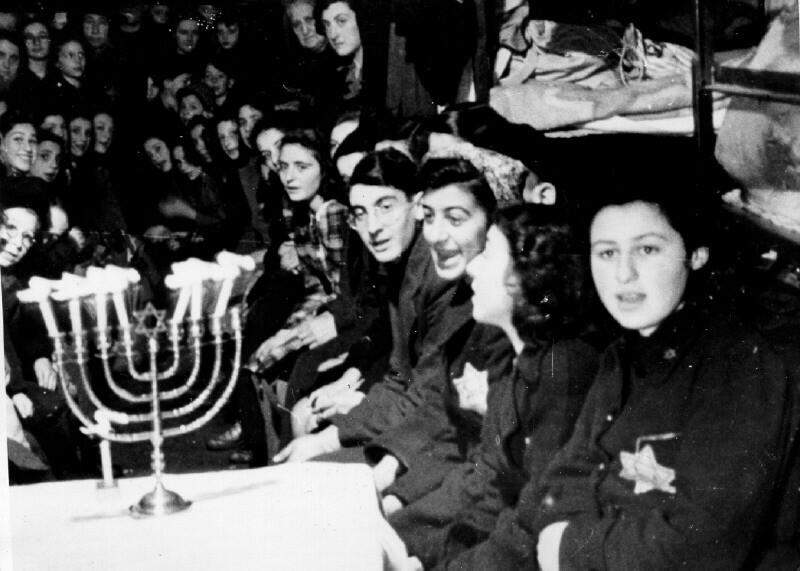
A Chanuka party in the Westerbork camp
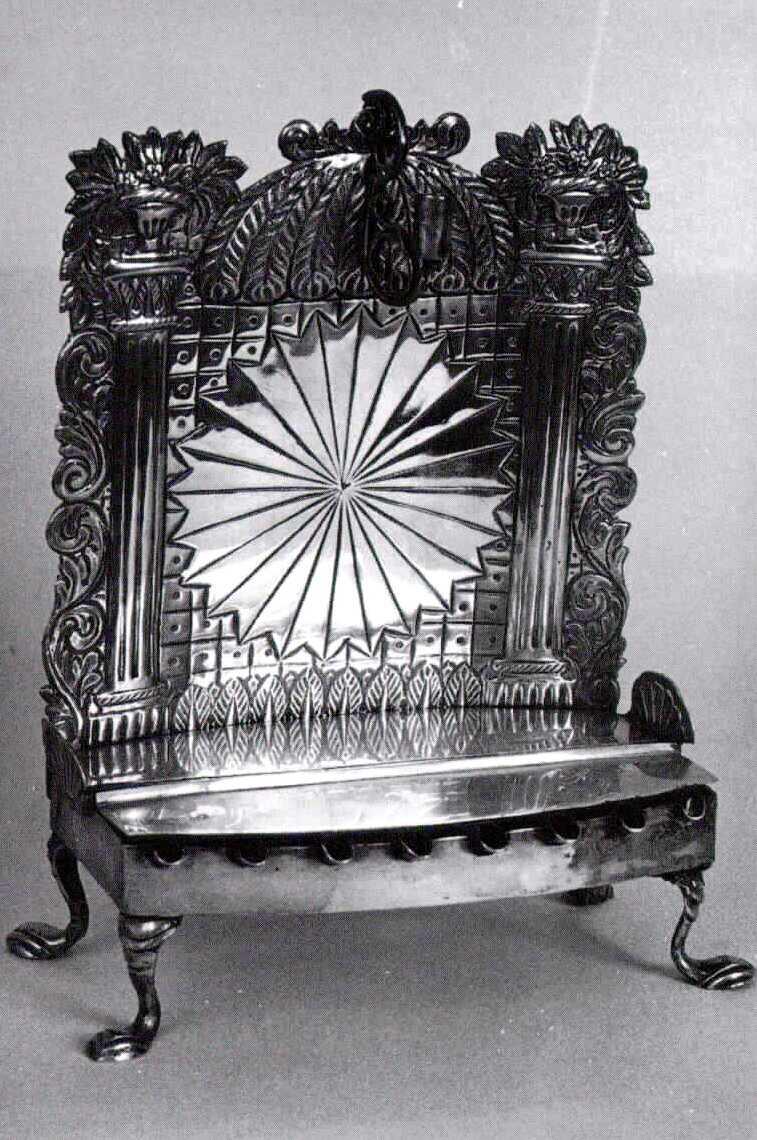
Rabbi Akiva Eiger’s Chanukia
Chava Frankel – Chanuka (Trzebinia, Poland)

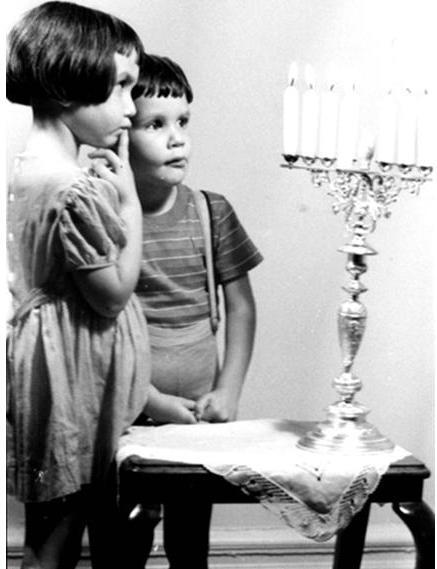
A brother and sister look at the Chanuka candles in their home in Berlin, Germany
Chanuka in Auschwitz
Chanuka in Auschwitz
It was Chanuka time. Where would we get the candles? Suggestions poured forth: we could easily make wicks by extracting threads from our garments; margarine could be melted down for oil. Then we had a vistor, our plumber friend, dropping in to repair some pipes. He spotted Rivkah and handed her a small package. Because it was very dangerous for a man to enter the women's quarters, even "on the job," no words were exchanged except for a whispered "l'chavod Chanuka" (in honour of Chanuka) to Rivkah as he slipped away from his work unnnoticed.
We held our breath as Rivkah opened the package. It contained two candles, two matches, and, unbelievably, two small candles. Our personal Prophet Elijah had brought us a genuine treasure. We would celebrate Chanuka with candlelighting tonight.
When the evening "coffee" rush subsided, Rivkah stepped to the hearth. "It's Chanuka tonight," she announced loudly. "Let's light the Chanuka candles."
Then, as we crowded around the hearth, Rivkah lit one of the little candles and recited the first blessing. "Blessed are You, Lord our G-d, King of the Universe, Who has sanctified us with His mitzvas and commanded us to light the Chanuka candle." The tiny flame flickered across the long, red-brick hearth. In the dim dungeon of Auschwitz a flame was kindled to dispel the gloom.
Now came the second blessing: "Blessed are You, Lord our G-d, King of the Universe, Who did wonders for our forefathers in those days, at this time." In our own times, too, G-d will do wonders for us. Finally she recited the Shehechiyanu (Who has given us life), heralding the beginning of the eight-day Festival of Lights: "Blessed are You, Lord our G-d, King of the Universe, Who has given us life, sustained us, and brought us to this moment." Not only had He given us life, He had permitted us to experience Chanuka.
Bitter thoughts filled us after this. Yes, He gave us life; but what of the others? Aren't they better off? Why hadn't we gone with them? Eyes filled with tears; chests heaved with pain.
Then we burst into "Maoz Tzur" (Rock of Ages), the traditional song whose first stanza exudes hope and faith in our forthcoming salvation. Then it speaks of pain: "Raot savah nafshi.." (my souls was replete with evils, in sorrow my strength drained away. The evils embittered my life...). Again we wept. Then our voices rose as another verse of hope was reached: "With Your outstretched arm, redeem Your people and avenge the innocent blood!"
Now Rivkah mounted the hearth and addressed her audience out loud, fearlessly. "Girls, we share the same bunks, the same pain, the same torture, the same deathly darkness. But tonight is Chanuka, when the Holy Temple was rededicated. We lit a candle and its tiny flame dispels a lot of darkness."
"My friends, the littel flame we kindled tonight is kodesh (holy). Eveyr Jewish heart has that sacred flame in it, a Divine spark that dispels so much of the darkness of this wretched world."
Her voice acquired a note of pathos as she continued. "Our people has lived through many bitter times. Our temple was defiled, desecrated, the sanctity of the Holy Place was profaned, degraded. It seemed that everything was burned and ruined - that there was no more pure oil left with which to light the sacred menorah. But in the midst of the devastation a small vial of pure oil was found and the eternal light rekindled. Then, by a miracle, that bit of oil lasted for eight full days, enough time to prepare more pure oil. For us, too, there is always a little pure oil left to keep the flame burning."
"We've been beaten, tortured, and killed. Pharaoh, Haman, the Romans, the Crusaders - they all sought to destroy the Jewish People. They failed; G-d helped us throughout history. He will help us now, too. Chin up, girls! Don't lose hope!"
"Even as our cup overflows with pain, G-d's mighty arm is already outstretched, and soon we will see the redemption. The torch the Jews carry in the darkness of night will never be extinguished. Great nations come and go, but the Jews will exist forever. Am Yisrael Chai! (the nation of Israel lives!)" Her last words reverberated through the heavy silence.
The girls, almost a thousand in number, remained crowded around the hearth. They were tattered, walking skeletons with teary, bulging eyes. But their town hearts were rekindled with hope and pride.
At that moment I turned and saw our dreaded blockalteste (barrack head), Raya, in the crowd. There, too, were her helpers, Rosika, Lilika, and Aranka. I shuddered from head to toe. Surely they would denounce us. And what would become of Rivkah?
They turned off the barrack lights quickly, as if they had been waiting for the speech to end. The girls dispersed, each to her bunk. An unusual stillness settled in. Each of us was wrapped in her own thoughts and feelings, her hopes soaring in the darkness of night. My sleep was troubled. Every few minutes I woke and reached for Rivkah, making sure she was still with us. In my feverish dreams, I imagined that the blockalteste and her aides had informed on her and were coming to take her away. Each time, however, I found Rivkah next to me, sleeping quietly.
So the night passed. Another Chanuka miracle had taken place: Rivkah had survived the fateful speech.
The uncommon silence of that night persisted into the next day, as if the whole camp had fallen under the spell of Rivkah's oratory. That evening, Luba lit the second candle. Again, everyone in the barracks looked on and joined in the singing. Again the festive mood evoked tears, sighs, memories, and hope. Again our overseers were in the crowed; this time they, too, were crying.
To Vanquish the Dragon, Pearl Benisch
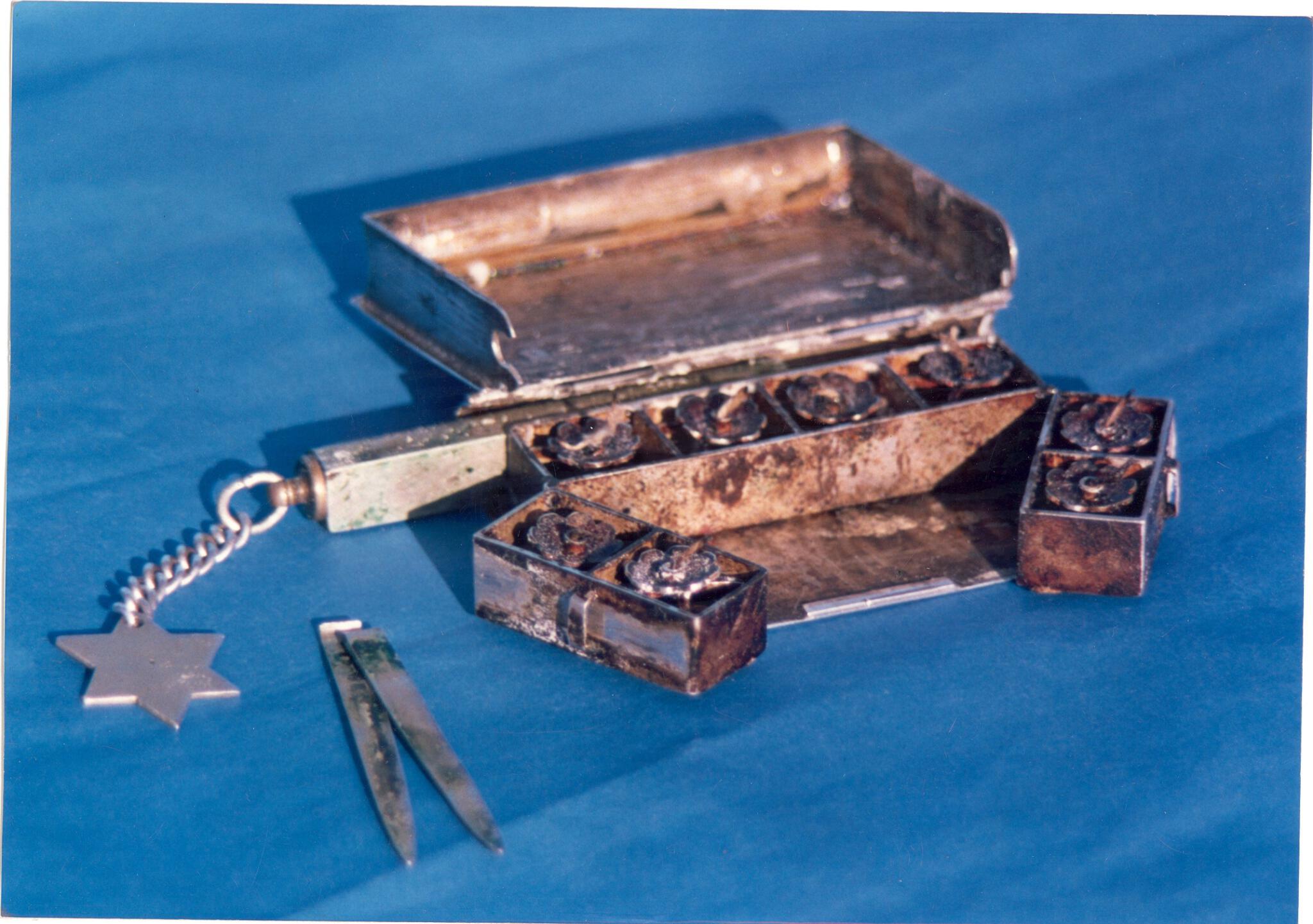
A miniature chanukiah made in the Lodz Ghetto despite the prohibition of lighting candles
Rabbi Sinai Adler – Chanuka in Auschwitz (Prague, Czechoslovakia)

Moshe Schnewald - Chanukah Candle in the Hospital in the Wolfsberg Camp (Szarvas, Hungary)

Rachel Herzl - Chanuka Lights (Hungary)













































































